ED STAFFORD T

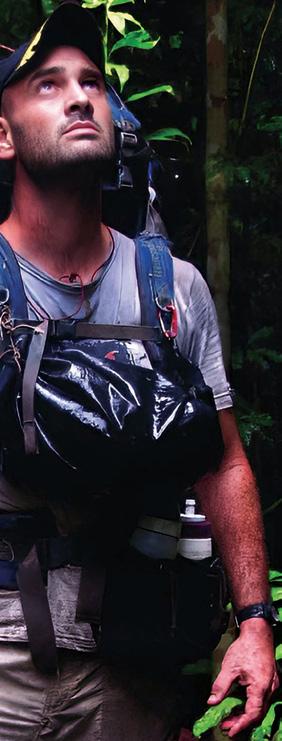

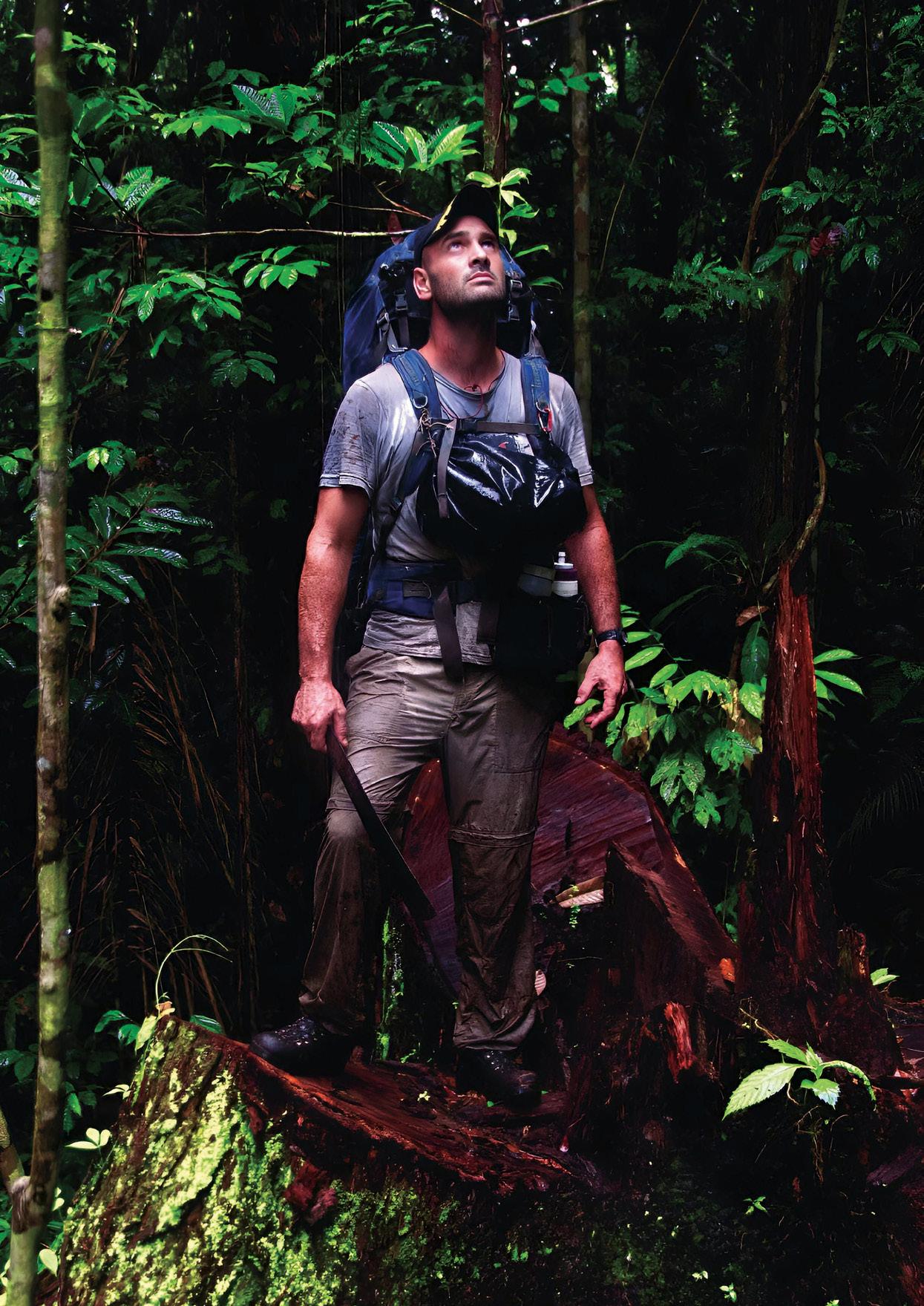
GREAT LEADERSHIP: FIND OUT WHAT IT TAKES
TAKE THE TEST: NAVIGATION
CADET'S GUIDE TO HAPPINESS
FRIENDSHIP | ACTION | ADVENTURE
ALSO IN THIS ISSUE: The briefing: news from across Army Cadets The Ulysses Trust
August 2023
FREE


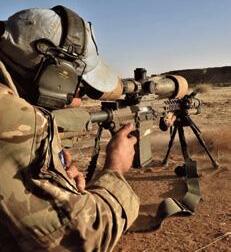

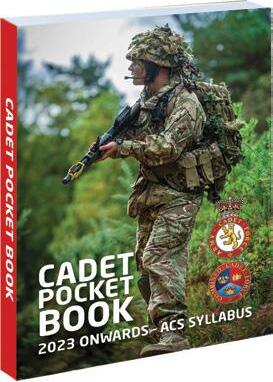
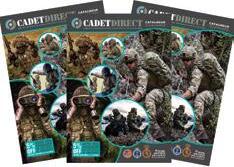

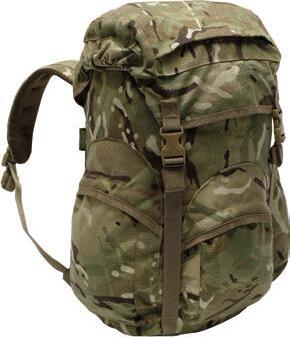
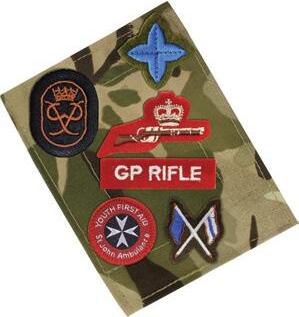
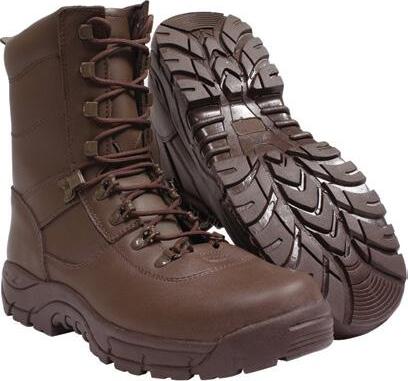
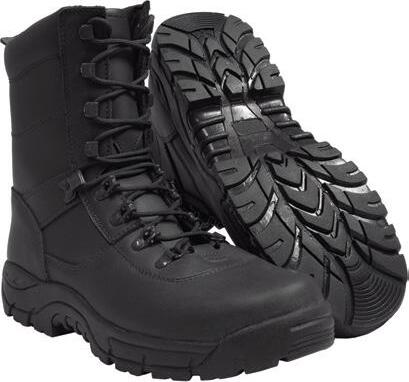
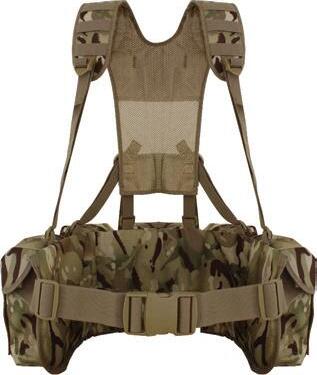
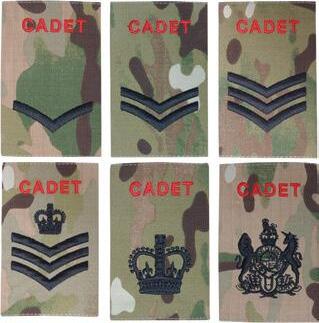
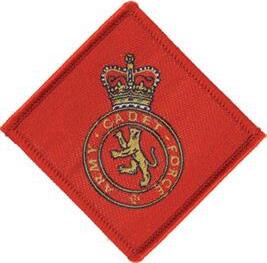








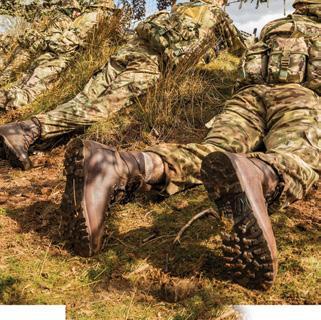
pq Payments secured by Kammo Tactical Daysack 25 Litre, MTP KT044/MTP £29.95 ACF/CCF MTP Cadet Rank Slides AA03RMC £5.25 ACF Adult CFAV flash CFAV/ACF £1.49 Proficiency Badges FROM £0.89 V I S I T W W W. C A D E T D I R E C T. C O M TO S E E O U R F U L L R A N G E Unit 4, Sybron Way, Crowborough, East Sussex TN6 3DZ E-mail: orders@cadetdirect.com • Telephone: 01892 662 230 Contains images licensed under the Open Government Licence v3 0 Combat Pro Boot, MoD Brown CD005 Brown CD007 Black FROM £49.96 NEW 2023 Cadet Pocket Book (ACS Syllabus) MB1 £11.95 Kammo Tactical MTP Airborne Webbing Set Mk 2 KT0CP FROM £64.95
CATALOGUE
2023 T H E U K ’ S L E A D I N G S U P P L I E R O F C A D E T U N I F O R M S & E Q U I P M E N T Army Cadet One Star Handbook (ACS Syllabus) MB21CP £9.99
ORDER A COPY ONLINE
Ido hope you had, or are having, a brilliant Annual Camp and are making the most of the final days of summer and its opportunities for outdoor activities.
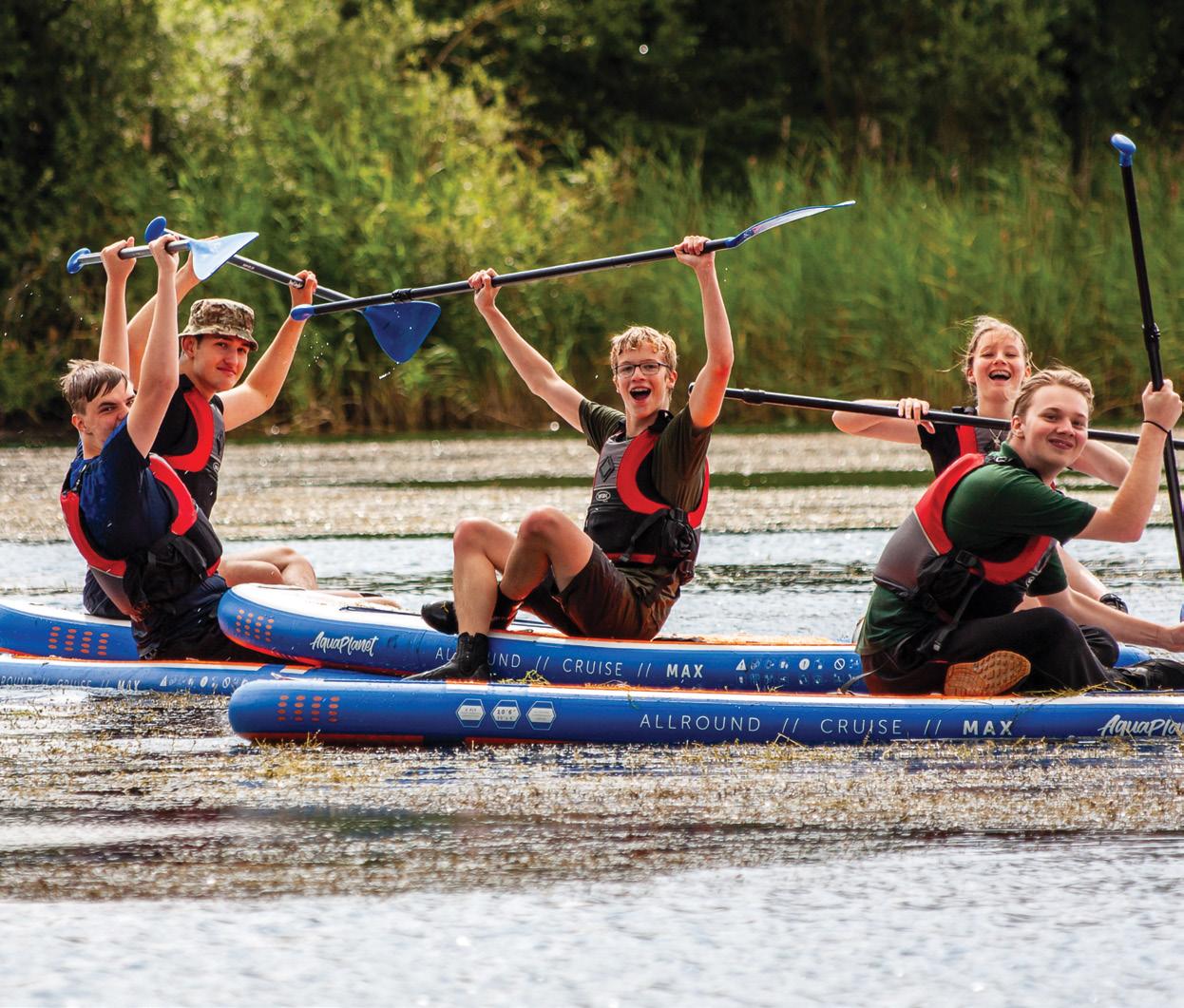
We have some great features to inspire you in this issue, including an interview with former cadet and amazing Amazon adventurer Ed Stafford. Read about his incredible exploits walking the entire length of the world’s longest river on page 16. We also chat to RSM Hope Relph of Somerset ACF about what it’s like to be a Lord-Lieutenant's Cadet.
Those looking to skill up won’t want to miss SO2 Leadership Cadet Forces Sarah McEntee’s

insights into becoming an authentic leader and developing first-rate communication skills. Plus, National Navigation Officer Colonel William "Ginge" Morris puts your orienteering skills to the test. Try his quiz on page 24.
There are so many ways that being in the Cadets supports good mental health. Do read the cadet's guide to happiness on page 30 for useful tips on how to boost your wellbeing.
Colonel Catherine Jardine Chief of Staff
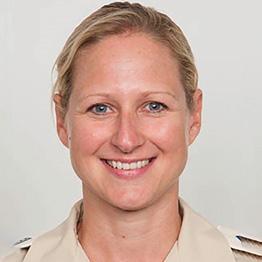
3 Copyright The contents of this magazine are fully protected by copyright and may not be reproduced without permission. Disclaimer While every effort has been made to ensure that adverts, details and articles appear correctly, Army Cadet Magazine cannot accept responsibility for any loss or damage caused directly or indirectly by the contents of this publication. The views expressed in this publication are not necessarily those of its publisher or editor. Army Cadet Magazine is produced by saltmedia.co.uk Welcome
'There are so many ways that being in the Cadets supports good mental health'
Cover image: from USA edition of Ed Stafford's book Walking The Amazon Photographer unknown.
Formerly known as CVQO
For 20 years CVQO has delivered BTEC and City & Guilds qualifications to thousands of cadets and CFAVs as part of their cadet activities. Now we are changing to become Cadet Vocational College, ready for a brand new chapter in our story, while still providing excellent educational opportunities for cadets and adult volunteers.
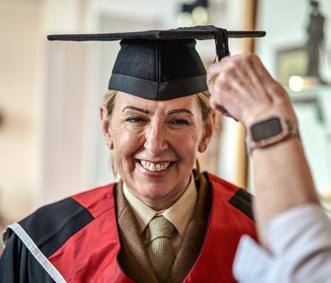
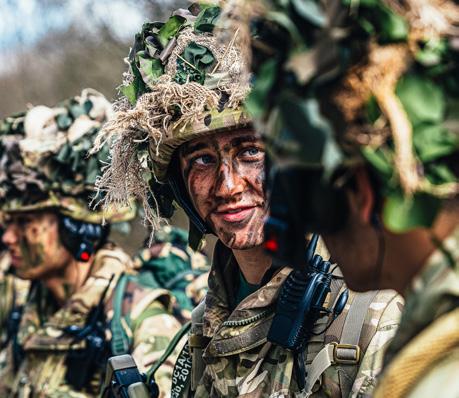
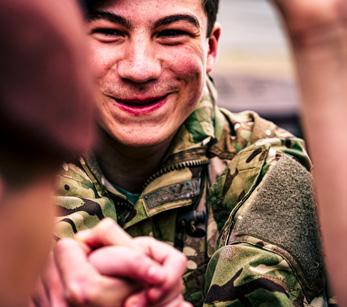
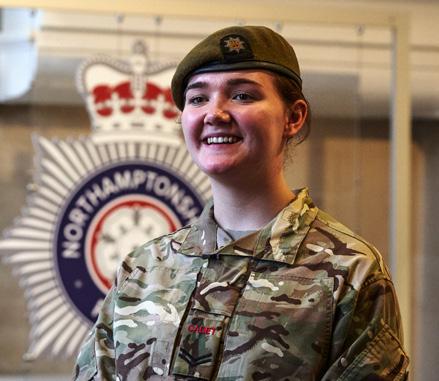
Turn
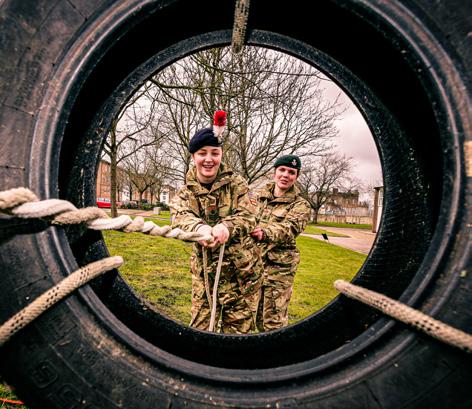
Charity Registered in England & Wales No. 1115234 | Charity Registered in Scotland No. SC039261 | Company Registered in England & Wales No. 5736932 CVQO Ltd, operating as Cadet Vocational College cvcollege.org
us on Get in touch for details
and
in
“New name, New Look, Same Vocation”
Follow
Eligible Army cadets can achieve a FREE BTEC Level 2 vocational qualification in Teamwork
Personal Development
the Community worth £1,250
your Army Cadet experience into a recognised qualification
Contents
6 The briefing
News from across Army Cadets.
14 Spotlight on ...
The Ulysses Trust, a charity that enables cadets to access adventurous training.
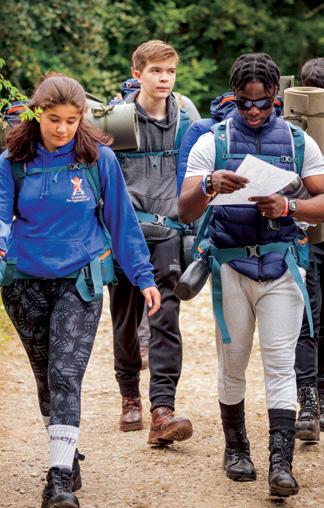
16 Amazon adventurer
Meet former cadet Ed Stafford, who has walked the length of the world's longest river.
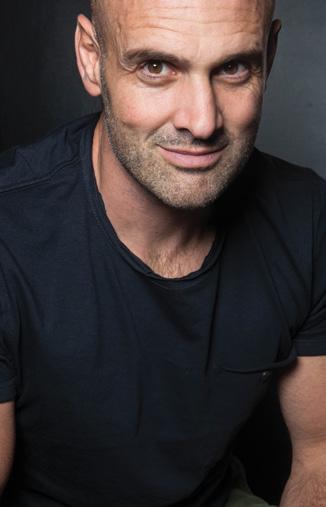
20 Authentic leadership

Sarah McEntee, SO2 Leadership Cadet Forces, shares 12 ways to sharpen your people skills.
24 Take the test
Colonel William "Ginge" Morris, National Navigation Officer, puts your orienteering skills to the test.
28 Highest honour
RSM Hope Relph of Somerset ACF reveals what it's like to be a Lord-Lieutenant's Cadet.
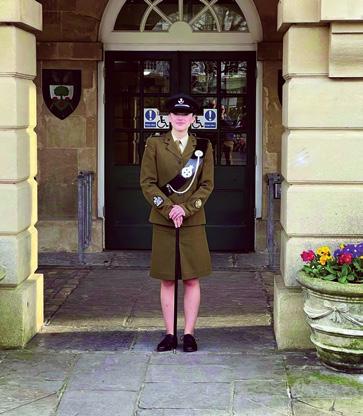
30 Cadet's guide to happiness
Five ways Army Cadets helps support happiness, wellbeing and good mental health.
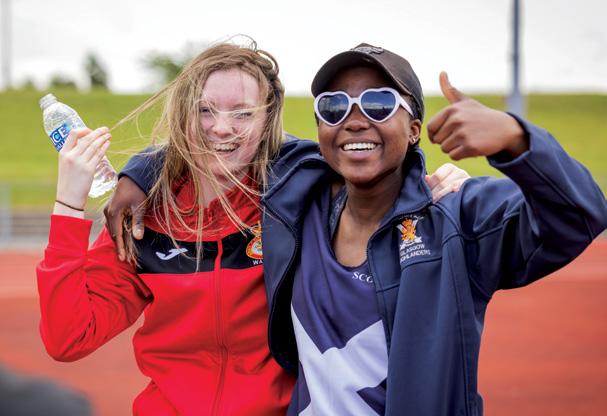
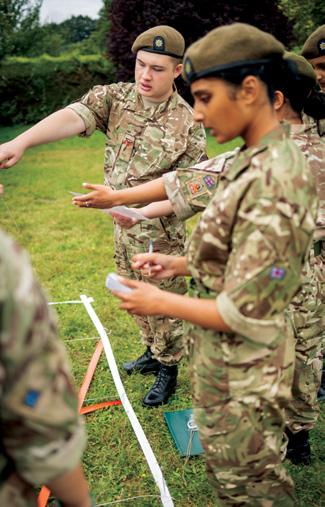
20 24 16 28
30
The briefing
News from across Army Cadets
Ex TELEMARK CHALLENGER
An epic 14-day skiing expedition in Norway in May was an awesome adventure for 16 cadets from across the UK.
The immense Ex TELEMARK CHALLENGER, supported by The Ulysses Trust, retraced the route taken by the Telemark saboteurs in the Second World War. (This group of heroic resistance fighters risked their lives to sabotage a Nazi nuclear programme, altering the course of the
war). Phase one involved a six-day Nordic ski touring training package, while phase two saw the group embark on a five-day self-sufficient ski tour across Hardangervidda (Northern Europe's highest mountain plateau), utilising pulks (sleds) and dog-sleigh teams.
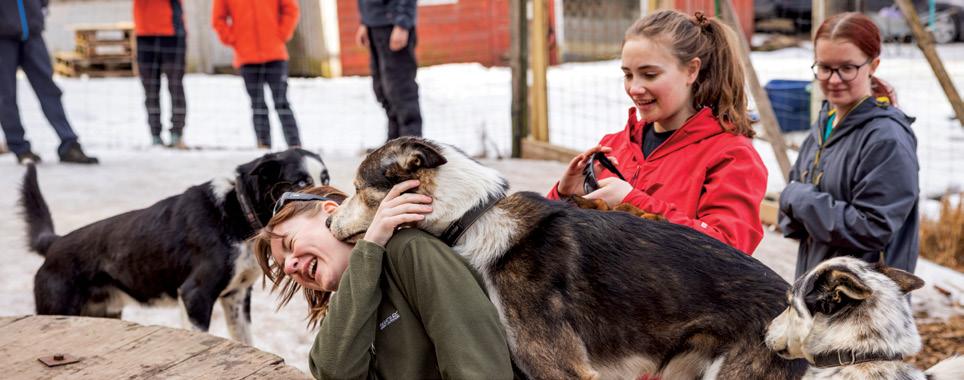
The AT expedition was a physical and mental challenge in sub-zero temperatures, but it was also an incredible opportunity for personal development and building of self-confidence. 'I've learnt more than I could ever imagine! Thanks to everyone for the opportunity of a lifetime,' said participant Cdt Cpl Ellis
CFAVs at Sandhurst
CFAVs from counties across the UK returned for the first face-to-face Initial Officer Training Course at Royal Military Academy Sandhurst (RMAS) since before the pandemic (when it was delivered virtually, then subsequently at Altcar Training Camp).
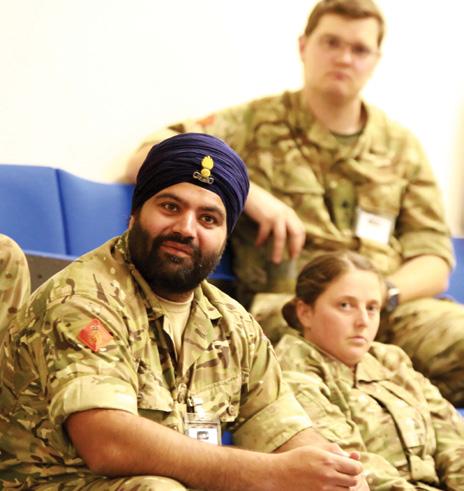
In May, 60 CFAVs who had been selected for commission by the Army Cadet Commissions Board attended two modules at the Royal Military Academy: Development (which focused on introduction to leadership) and Confirmatory (which put the theory into practice). On completion of both modules (and after two years of time served and 20 days of cadet activity), CFAVs became eligible for promotion to Lieutenant.
'This course was one of the best I have been on in my Cadets service,' said 2Lt Andy Mead ACF. 'I enjoyed every minute and would recommend it to everybody.'
6
© Crown Copyright
International Cadet Cup
The third International Cadet Cup took place recently in Hungary. Cdt Cpl Claudiu Leonard Doroftei, Cdt Sgt Harvey Elliott, Cdt Myles Mason (all Bristol ACF) and Cdt LCpl Eleanor Curnow (Cornwall ACF) were accompanied by Maj Dennis Hull and Lt Poppy Gates to the under-18 athletic event, which is run by the Hungarian Ministry of Defence.
Cadets took part in a number of events which were run and supervised by the Hungarian Army, including laser run shooting, a labyrinth matrix run, first aid, hand grenade throwing, distance estimation, an obstacle course and a relay run with rifle. The competition culminated in a prize-giving presentation.
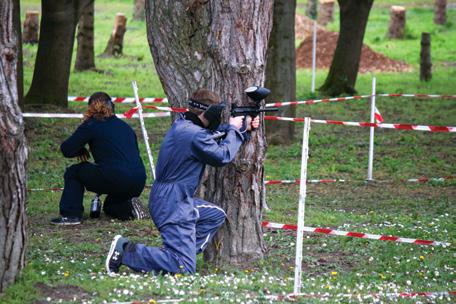
Maj Hull said: 'The event pushed the cadets to their limits physically and mentally, but they thoroughly enjoyed it!'
Cadets from Antigua visit Cumbria ACF
Cumbria ACF played host to cadets from Antigua and Barbuda for a week in April, following a successful trip to Antigua in October 2022 as part of an exchange programme between the Cadet Forces.
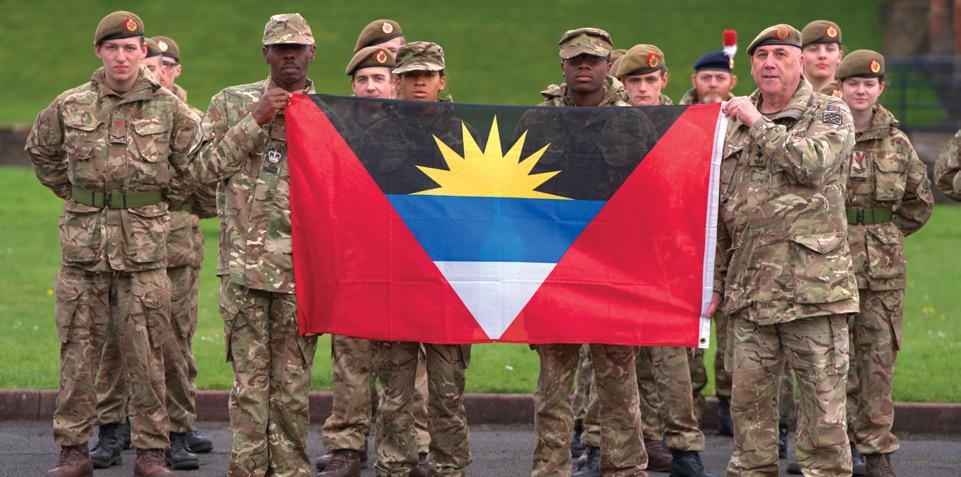
Cadets enjoyed a jam-packed programme of activities that displayed British life in all its beauty. They took part in the Lake District Sheep Dog Experience, took a lake cruise to Ambleside, participated in STEM activities at Barrow detachment, gained
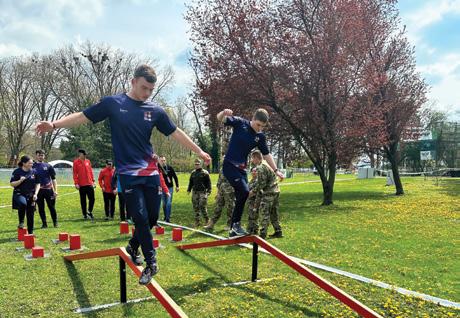
historical knowledge with museum and castle trips, visited an indoor shooting range, and completed fieldcraft and drill exercises.
A final parade concluded the time together, including a presentation and a number of cadets being awarded star-level passes.
Click here or scan the QR code to watch video footage of the exchange.
7
THE BRIEFING
The briefing
News from across Army Cadets
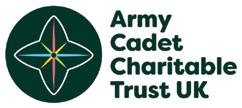
Poignant battlefield tours

Two counties got to witness the impact war can have on landscapes and lives during recent battlefield tours. Both excursions were made possible due to grants from ACCT UK and were an opportunity to pay respects to those who made the ultimate sacrifice for their country.
Thirty four cadets from Norfolk ACF's Artillery Battery, Engineer Squadron and Britannia Company attended a five-day WW2 Battlefield Tour of Dunkirk. The group followed the route taken by the 2nd Battalion Royal Norfolk Regiment during the campaign. A solemn but important highlight was a visit to pay respects to the 97 Royal Norfolk POWs who died at the hands of the SS at La Paradis.
Musical spectacle returns
The ACCT Scotland Beating Retreat made a triumphant return for the first time in four years. Cadets from across the UK came together to perform at Edinburgh Castle for the musical extravaganza.
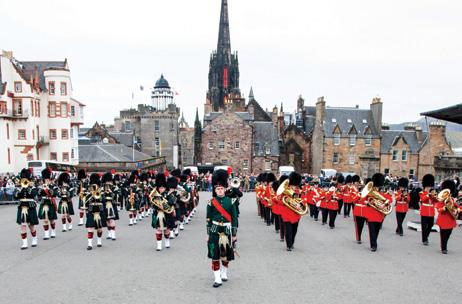
It included a massed bands display, light infantry bugling spectacle, and a massed Pipes and Drums display. There were over 130 Army Cadet musicians involved from Scotland, Durham ACF, Gwent and Powys ACF and Campbell College CCF, as well as guests from the Royal Air Force Air Cadets.
Col Ashley Fulford, National Colonel Cadets, said it was 'an outstanding event that made all of us who are associated with the Cadets very proud. Well done to everyone involved.'
A group of 86 cadets and 14 CFAVs from Dyfed and Glamorgan ACF visited Ypres in Belgium for the two-day battlefield study Ex Dreigiau Cadlanc.
They visited cemeteries, museums and first world war trenches in Sanctuary Wood and Hooge Crater. A particularly moving moment was a wreath laying at the Welsh cromlech (pictured) at Pilkem Ridge, where an imposing Welsh dragon memorialises those of Welsh descent who took part in the First World War. Dyfed and Glamorgan ACF raised £10,000 for it to be built and were one of its highest fundraisers.
Cadets also took centre stage at the Menin Gate Last Post ceremony alongside the Military Wives Choir. 'They were watched by hundreds of members of the public and did the ACF proud,' said Maj Richard Holder, Assistant Commandant, Dyfed and Glamorgan ACF. 'I also had the honour of reciting the exhortation before the minute's silence.'
Particular congratulations to Cdt Bandmaster Tom Lord who led the massed bands, National Senior Drum Major Kayleigh Young who led the Pipes and Drums, and National Cdt Pipe Major Rowan Laws who played the solo part in Amazing Grace (all Black Watch Bn ACF).
8
Photo: Dougie Johnston
News from
ACCT UK Excellence Awards
Congratulations to the winners of ACCT UK's Excellence Awards (supported by BAE Systems), held in London in June, presented by guest of honour Colonel Professor Sir Jonathan Van-Tam MBE, Honorary Colonel Army Cadets Medical Support.
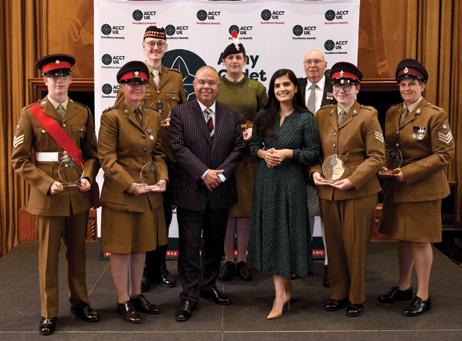
Duke of Edinburgh's Award
Cdt Sgt Ezri Spring (Kent ACF)
Maj (retd) Alan Thompson (Northumbria ACF)
First Aid
Cdt Colour Sgt Dawson Whitelegg (Bedfordshire and Hertfordshire ACF)
Staff Sgt Instructor Amanda Wixon (Greater London South East Sector ACF)
Music
Cdt Company Sgt Maj Nicole Pennington (Greater Manchester ACF)
2nd Lt Callum Mellis (51 Brigade, Black Watch Battalion Scotland ACF)
Sport
Cdt Cpl Dylan Perkin (Clwyd and Gwynedd ACF) Capt Rachael Jones (Gwent and Powys ACF)
Community Service (donor: Ammo & Co)
Cdt Cpl William Callaghan (Yorkshire North and West ACF)
2nd Lt Michael Stokes and 2nd Lt Sarah Stokes (Gloucestershire ACF)
Marathon success
A huge well done and thank you to Louise McCauley, Sports Officer for Lothian and Borders Bn, who completed the Edinburgh Marathon and raised an impressive £900 for ACCT UK and Cornhill Macmillan Centre in Perth.
Congratulations to SSI Donna Hawley (adult instructor for Yorkshire North and West ACF), Rebecca Trinity Jones (former cadet) and Rob Warner (ACCT UK supporter through his employer Ammo & Co which runs Cadet Kit Shop) for conquering the 100-mile RideLondon cycling challenge.
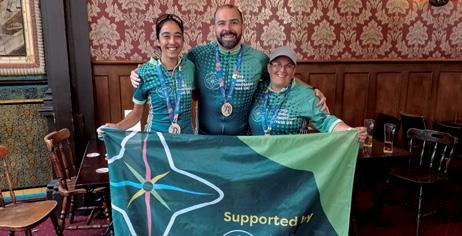
Their efforts have raised a whopping £1897.25 to support cadets and adult volunteers.
Feeling inspired? Register your interest for RideLondon 2024 by emailing fundraising@acctuk.org
Cadet Challenge 2023: your adventure awaits!
Many counties have kickstarted the Cadet Challenge 2023 with a variety of inventive fundraisers: City & County of Bristol ACF are set to take the plunge with a sponsored parachute jump, Devon ACF embarked on a gruelling 16-hour drill marathon, Wiltshire ACF hosted a coronation family day with a hog roast and bouncy castle, and Orkney & Shetland ACF held a bake sale at their NAFFI.
There's also the opportunity for a solo mission, like that done by Maj Mark Evans, area commander of E Company, Gwent & Powys ACF, who is doing a trig-bagging challenge; instructor PI Zack Feve of Epworth and Isle of Axholme detachment, Humberside & South Yorkshire ACF, who will take on the Three Peaks; and Commandant Colonel Catherine Harrison of Greater Manchester ACF who completed the Great North SwimRun and raised £155. What challenge will you take on?
Share challenges and pictures with fundraising@acctuk.org
Set up a fundraising page with Enthuse, JustGiving or GoFundMe: search for 'Army Cadet Charitable Trust UK' or charity number 305962.
Two prestigious awards will be given to the most inspiring cadet and CFAV for their fundraising efforts.
9
RideLondon
THE BRIEFING
The briefing News from across Army Cadets
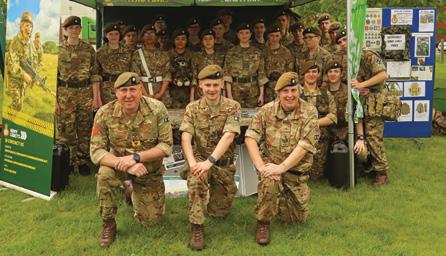
Ex WAR HORSE
Thanks to generous grants from South East Reserve Forces' and Cadets' Association and The Connaught Trust, cadets from Hampshire and Isle of Wight ACF travelled to Flanders, Belgium, at Easter for Ex WAR HORSE – a unique tour of the First World War battlefields of the Western Front.
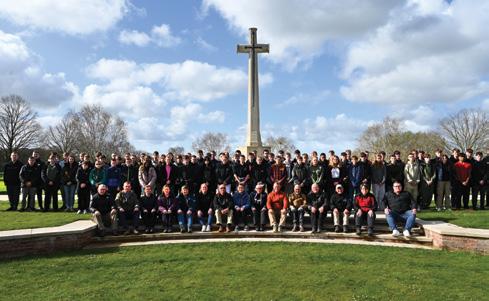
The County's Dettingen Music Band led the trip (supported by band members from Derbyshire ACF and Gwent and Powys ACF), which incorporated visits to war cemeteries and culminated in a poignant drumhead service at Tyne Cot Commonwealth War Graves Cemetery, and a moving parade and performance at the Menin Gate.
'I am immensely proud of the hard work and dedication of our cadets and CFAVs who ... put on a string of great performances and acts of remembrance in and around Ypres, Belgium,' said Col Tim Hope MBE, Commandant of Hampshire and Isle of Wight ACF.
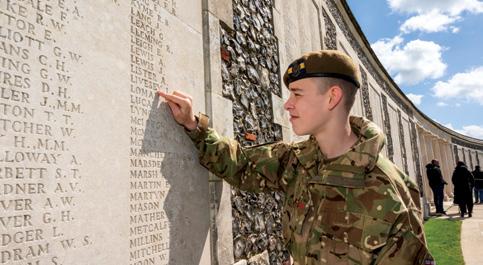
Royal celebrations
While some cadets had the once-in-a-lifetime privilege of being involved in the splendour and pageantry of the coronation of King Charles III in London (see June's issue), others marked the occasion in different ways.
Cambridgeshire ACF commemorated VE Day alongside coronation celebrations by serving afternoon tea to the community at the Royal British Legion's Chatteris branch, taking part in memorial services in Ramsey and Newmarket, and demonstrating Cadet activities at a recruitment stand at Newmarket Coronation Fair.
Two lucky cadets from Cumbria ACF –Cdt Cpl Jasmine Bell from Longtown and Cdt LCpl Ziva Scott from Kendal – were among attendees of the Coronation Concert at Windsor Castle. They were awarded the tickets (donated by the former Lord-Lieutenant of Cumbria, Mrs Claire Hensman CVO) as prizes for being top cadet and most improved cadet in the skills of fieldcraft at their recent camp.
On April 30, D Company (Leicestershire, Northamptonshire and Rutland ACF) were invited to attend Choral Evensong at All Saints Church Northampton in the week of prayer leading up to the King's coronation.
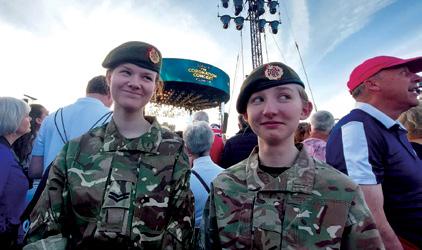
10
Record-breaking endurance
SI Paddy Doyle, CCF Sgt Instructor of The Streetly Academy in Sutton Coldfield, recently smashed 12 physical fitness challenges, making his career total an extraordinary 768 documented endurance feats. They included cross-country speed marching carrying a 50lb backpack, mountain biking carrying 35lb extra weight, and the fastest shuttle walk holding
Cadet success at Ten Tors
Army Cadet teams from the counties of Cornwall, Devon, Dorset, Gloucestershire, Somerset and Wiltshire took part in the annual Ten Tors Challenge in April.
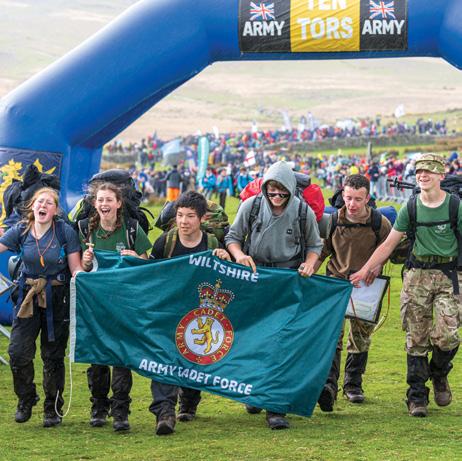
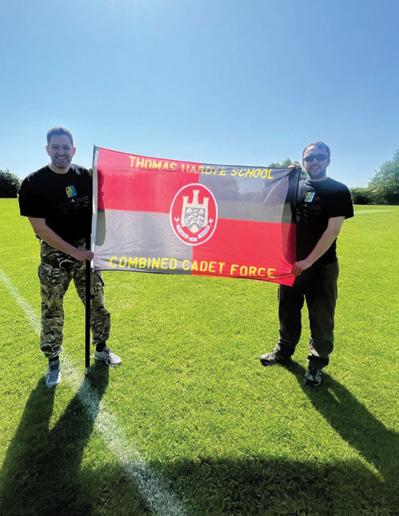
CFAVs and cadets spent seven months training and organising themselves for the two-day event, which saw teams navigate routes of 35, 45 or 55 miles across Dartmoor, visiting ten tors (or checkpoints) along the way. They carried all they needed to stay overnight and complete the route. Terrain, distances and the weather all presented challenges, so commitment, training, endurance and grit were vital.
A huge well done to all teams who completed the challenge. If you are in the South West region and are interested in taking part in Ten Tors 2024, speak to your detachment commander.
a 34lb solid concrete block and carrying a 50lb backpack. Although battling through injury, Paddy stayed positive: 'Staying on top of my training paid off!
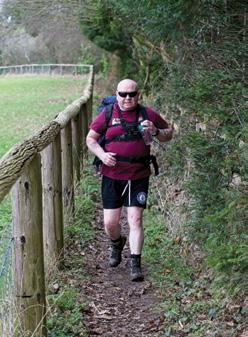
'Military-grade strength, speed and stamina challenges and world records are getting more popular and being attempted by current and former armed forces personnel, which is great to see.'
Smile4Wessex
Cadets and CFAVs from Thomas Hardye School CCF in Dorchester took part in the 2x2x24 Challenge: walking, jogging or running two miles, every two hours, over a 24-hour period.
They raised money for Smile4Wessex, which funds cutting-edge medical equipment and treatments for the Wessex Neurological Centre in Southampton. The link with the charity was made after a CFAV became critically ill following a cadet training weekend and was taken to Wessex Neurological Centre for life-saving emergency surgeries.
11
Photo: Peter Russell
Photo: David Hastings
THE BRIEFING
Army Cadets National Ambassador Jordan Wylie (left) supported the fundraising efforts by jogging four miles and spending time with cadets and CCF staff
The briefing News
from across Army Cadets
DofE news
Congratulations to the following who have completed their Gold DofE Award:
Staff Cdt Sgt Nadia Cavanagh Wiltshire ACF
Cdt Cpl Owen Sharman Devon ACF
NUV Ana Izidoro Greater London and SW Sector ACF
AUO Alexandra McKenna Lothian and Border Bn ACF
Cdt Cpl Theo Williams Hampshire and Isle of Wight ACF
Cdt LCpl Finn Allen Dorset ACF
Col Ashley Fulford, Col Cadets, presented the following at the annual DofE conference:
DofE Long Service, 25 years
Maj Ness Dawkins, HQNW DofE Advisor
Capt Simon Chaplin, DofE Officer Gwent and Powys ACF
Trophy for Most Improved County in DofE
1st place – Glasgow & Lanarkshire Bn ACF
2nd place – Black Watch Bn ACF
3rd place – Cumbria ACF
Quaich Trophy for Best Performing County in DofE
1st place – Lincolnshire ACF
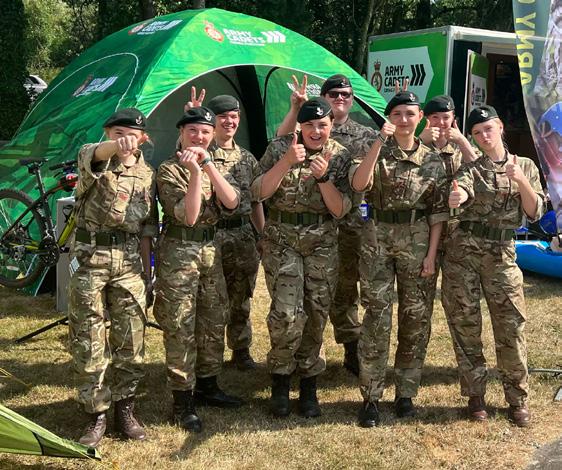
2nd place – Somerset ACF
3rd place – Oxfordshire ACF
Fun-filled display at Royal Cornwall Show
Cadets from Cornwall ACF demonstrated the value of Army Cadets to the public at this year's Royal Cornwall Show with a professional and engaging display. An observation trail (where children were asked to look for a cadet's lost equipment) and new paintball target range proved particularly popular – local radio personalities from Pirate FM even took part in the paintballing! A special shout-out to Cdt LCpl Crouchman from Launceston detachment who dressed in a ghillie suit and came third in the PirateFM mascot dance-off.
Outstanding actions
Cdt LCpl Rowan Parr (pictured) of St Helens Detachment, 2 Company, Merseyside ACF, has been awarded a Consultant Paramedic Community Commendation for administering first aid to a 73-year-old member of the public who suffered a fall at Lime Street Station and sustained a serious head injury.
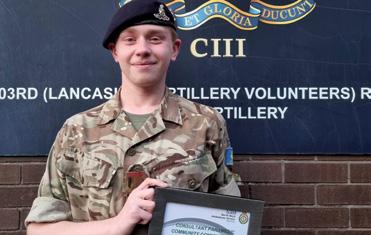
Cdt Cpl Adam Oliver of Norfolk ACF has received a Letter of Commendation from The Society for the Protection of Life from Fire (SPLF). When travelling home from Cadets, Adam came across a car that had caught fire. He managed the situation, prevented danger to other vehicles and handed over to the emergency services.
Well done to Rowan and Adam.
12
UNIVERSITY OFFICERS' TRAINING CORPS
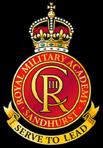
Enjoyed the Cadets at school and going to university this September? Take the next step and join the national network of University Officers’ Training Corps. You will be given internationally recognised leadership training, make life-long friends and have amazing adventures, while doubling as a part-time paid job. There is no commitment to join the Army afterwards and you can leave at anytime.
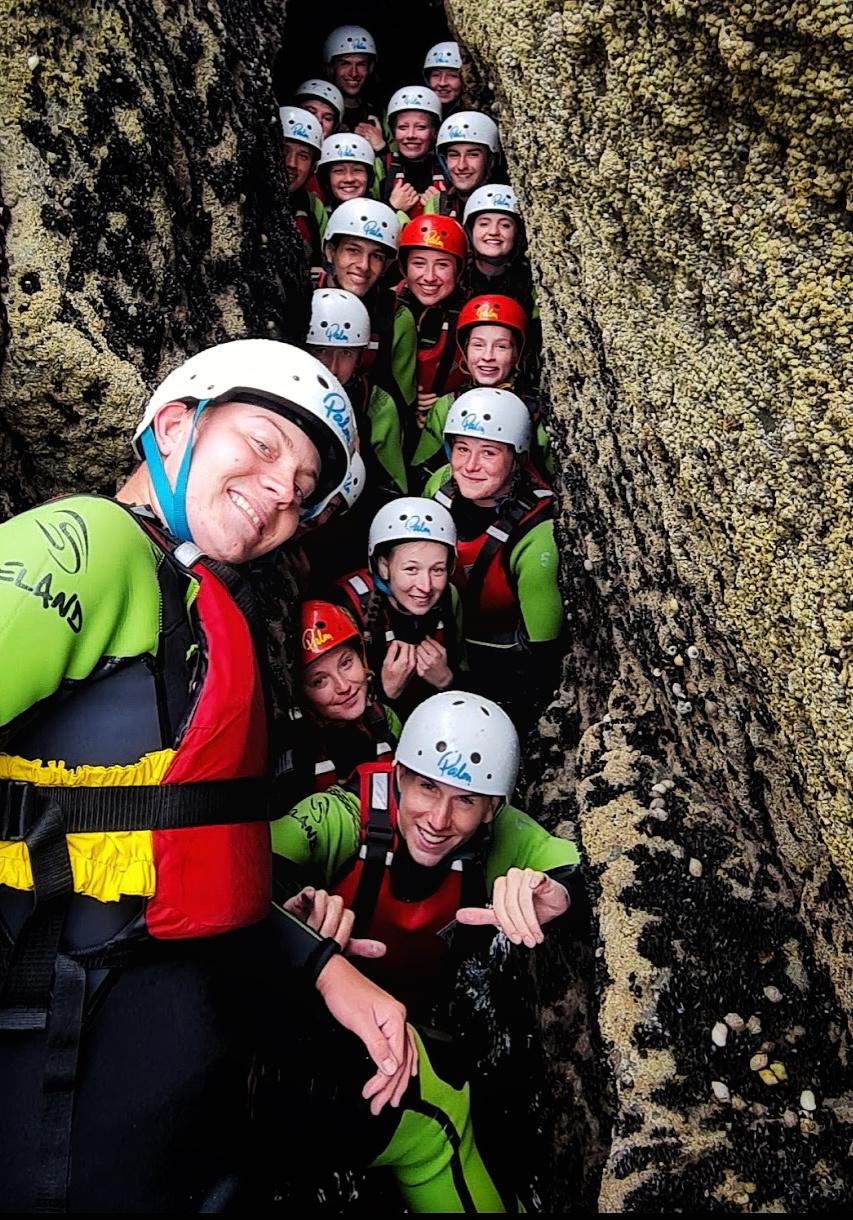
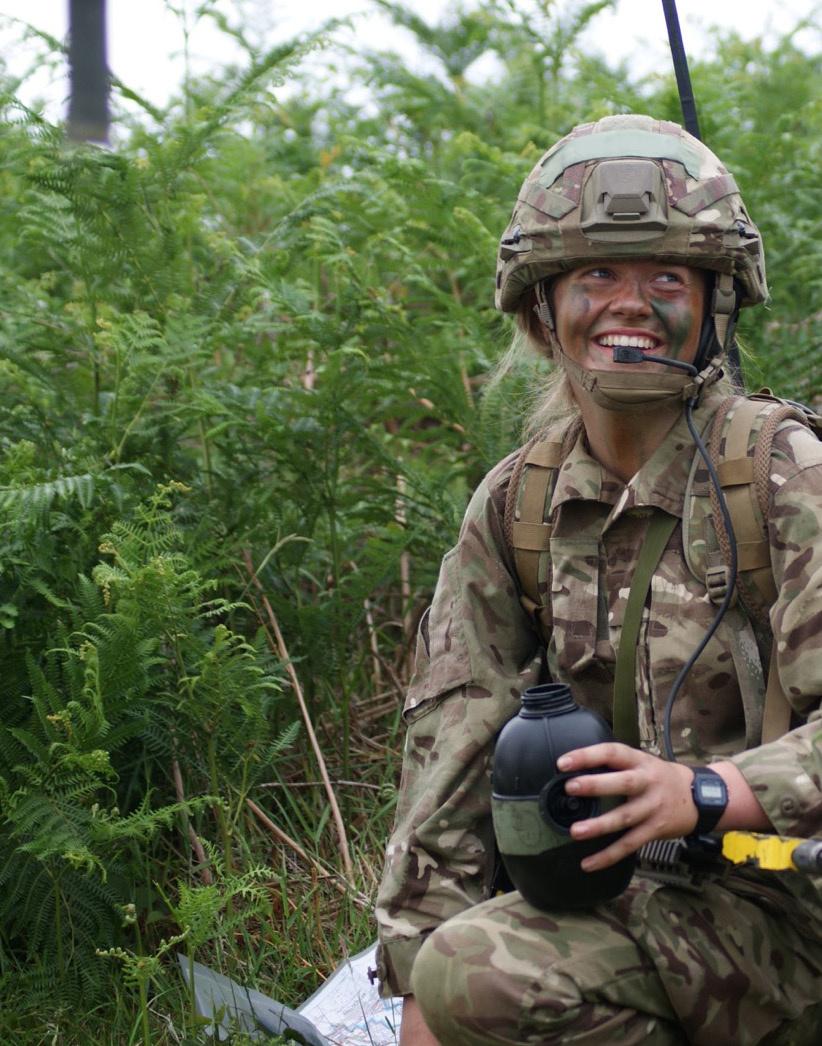
FURTHER INFORMATION:
https://www.facebook.com/ArmyUOTC/ https://www.instagram.com/uotc_main/?hl=en


APPLY NOW ONLINE
Creative media design ADR010752
SPOTLIGHT ON…
Army
The Trust supports adventurous training expedition involvement because of its potential to give young people valuable life skills, including teamwork and physical wellbeing.
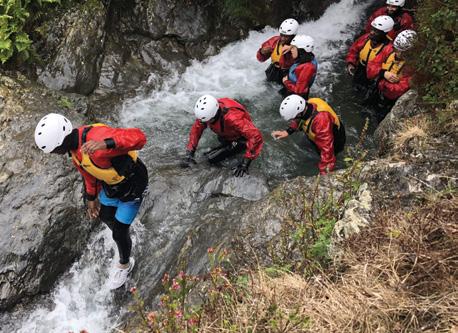
'Adventure, particularly at a young age, is almost always a transformational experience,' said explorer, author and The Ulysses Trust Ambassador Levison Wood. 'Last year marked the 30th anniversary of The Ulysses Trust: 30 years of giving young people the opportunity to test themselves and learn what they are capable of.'
Vision
Mission
To provide financial assistance, encouragement and guidance to support challenging expeditions and adventurous activities planned and undertaken by the Volunteer Reserve and Cadet Forces of the UK.
Since its inception, it has raised over £3.6 million to support over 41,000 individuals in over 3,030 expeditions. His Majesty King Charles III is the charity's patron.
Benefits
To enhance unit and force morale, recruitment, retention and public esteem. The Trust also helps develop an individual's leadership, teamwork, confidence, courage, initiative, self-discipline and judgement.
To bring the benefits of challenging, adventurous and community-related expeditions within the financial reach of every member of the UK’s Volunteer Reserve and Cadet Forces.
Eligibility
All Cadet Forces are eligible to apply for a grant to help fund an expedition. Expeditions must be sponsored by a Unit or HQ and have ACEATFA or other appropriate authorisation.
Post-pandemic, The Ulysses Trust relaxed its requirements for grants and provided more funds to assist activities, specifically for disadvantaged young people. This move saw a dramatic increase in the number of expeditions and participants supported.
The Ulysses Trust Expedition Awards
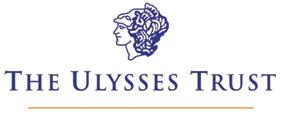
Each year, The Ulysses Trust presents three awards for the finest expeditions (showcasing the best in leadership, challenge, courage and planning) among Cadet Forces, University Units and Volunteer Reserve Forces.
Last year's cadet category winner was Round the Island 2022 – a yacht race round the Isle of Wight from 24–26 June, completed by UTC Reading CCF and funded by The Ulysses Trust.
'This is making memories kind of stuff; we’ll not forget this for the rest of our lives,' said Year 11 student Mutahira Sheikh.
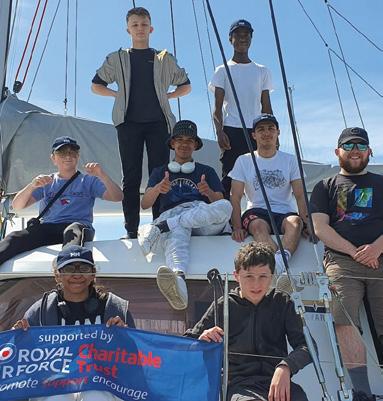
14
Cadets is supported by a number of incredible charities. This issue we shine a light on the fantastic work of The Ulysses Trust, which enables cadets to gain life skills through access to adventurous training activities.
Trust grant results in brilliant gains
A CCF unit was on the verge of collapse before involvement from The Ulysses Trust saw a turnaround in its popularity.
The Pioneer Secondary Academy CCF unit in Stoke Poges, Buckinghamshire, was set up in 2017 through the Cadet Expansion Programme (CEP) but failed to gain momentum.
An expedition to Snowdonia National Park was proposed as a game-changing initiative to revive the failing unit. The prospect of adventure was a strong incentive for cadets and CFAVs to get involved, but it was a £5,796 grant from The Ulysses Trust that guaranteed it went ahead and was affordable for all.
The sky's the limit
Skydiving remains a bucket-list fantasy for many but, thanks to a two-year fundraising campaign and donations from The Ulysses Trust, nine Norfolk ACF cadets became qualified skydivers in 2022.
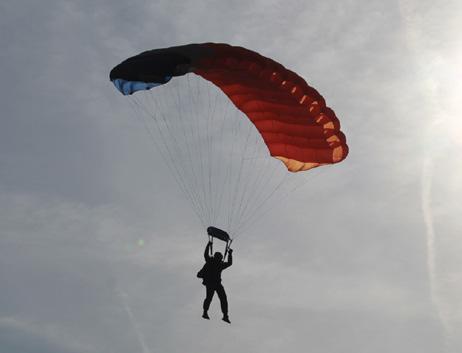
Initially planned as a two-week residential skydiving expedition in Spain in 2020, plans were scuppered by the pandemic. The expedition eventually took place at Skydive Hibaldstow in north Lincolnshire in April 2022.
The build-up included 12 exercises – mostly AT –which ensured the unit was well prepared. In July 2022, 24 cadets deployed to Snowdonia with four CFAVs. They engaged in challenging activities which pushed them out of their comfort zones, including a two-day wild camping expedition and a canoe journey down the estuary which ended with an evening campfire on the beach.
'I did things I thought I would never do, such as jumping in the water,' said Cdt LCpl Nicola Chumber. 'I can’t swim but challenged myself and took the chance to complete every single opportunity that was given to me.'
Following the expedition, the unit doubled in size – a direct result of the expedition and the charity's help.
Cadets and CFAVs were overcome by the once-ina-lifetime experience: 'I personally don't believe the exped could have been any better,' said Cdt LCpl Micah Bailey. Expedition leader Major John Stopford-Pickering appreciated the part The Ulysses Trust played in the process: 'We are all very grateful to The Ulysses Trust and our other donors for their support which helped to make this expedition possible.'

Go further
Discover upcoming adventures taking place with the help of The Ulysses Trust, and apply for grants. Click here or scan the QR code.
Click here and here or scan the QR codes to check out two epic videos from the dive.
www.ulyssestrust.co.uk
15
SPOTLIGHT
AMAZON
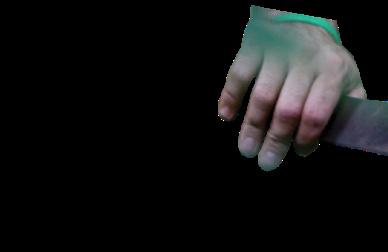
Ed Stafford is the 21st-century embodiment of an adventure hero. He holds the Guinness World Record for being the first human to walk the entire length (4,225 miles) of the Amazon River, a journey that saw him held up at arrow point and mistakenly arrested for murder. The former soldier also spent two months alone on the Pacific island of Olorua for the Discovery Channel UK's Naked and Marooned.
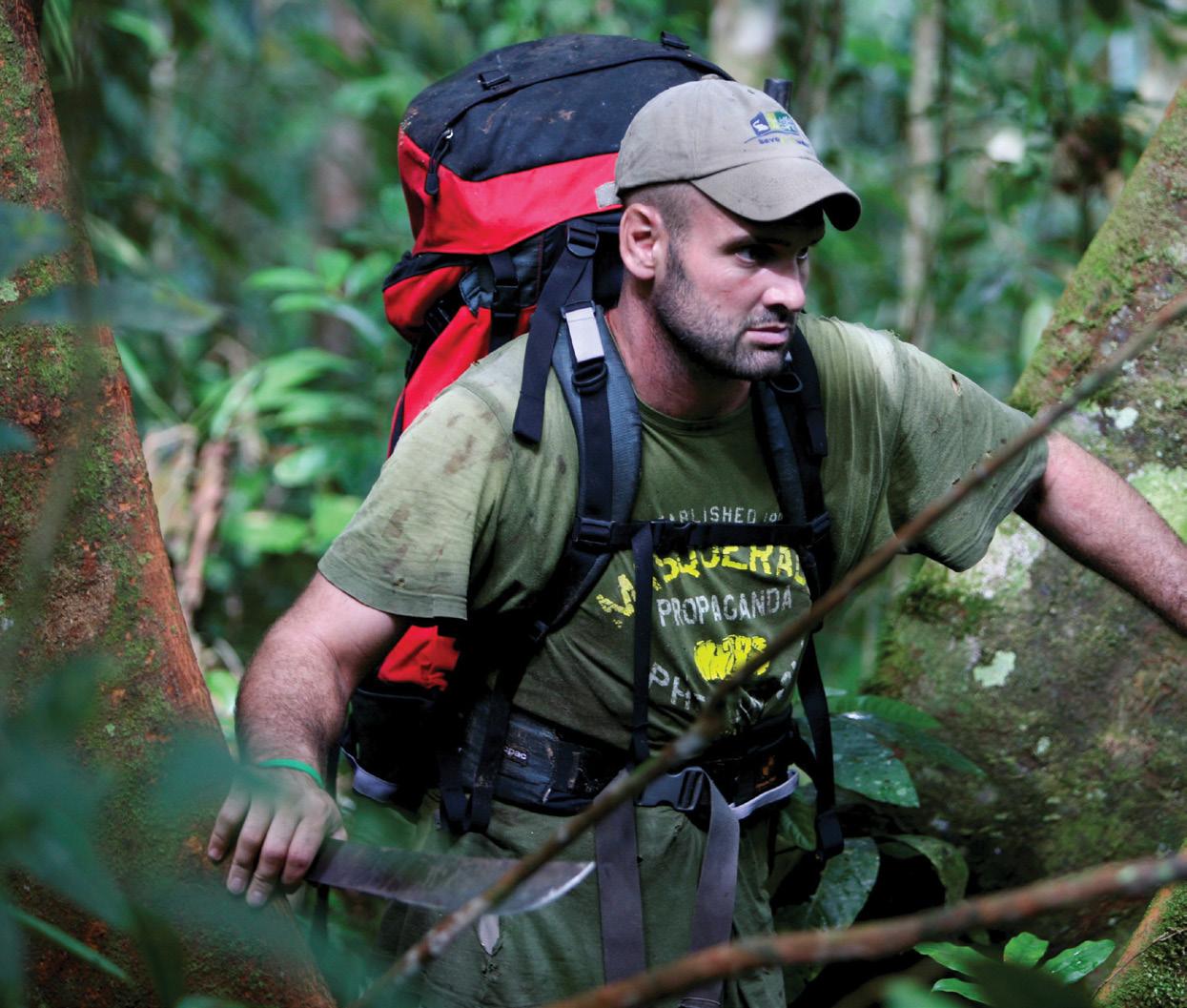
To raise social awareness, he lived with travelling communities for Channel 4's 60 Days with the Gypsies and experienced first-hand the hardships faced by residents on some of the UK's most troubled housing estates for Channel 4's 60 Days on the Estates.
Tell us about your time as a cadet
I went to Uppingham School in Rutland, and Cadets was one of the areas in which it excelled. Joining harnessed my energy that was being misplaced by being naughty and disruptive (I got into trouble for chopping down a tree the Queen had planted!). I was in the Royal Marine Cadets and made the rank of Sergeant. It enabled me to channel my passion for being outdoors into something practical, learning new skills such as weapon handling.
The whole camp experience had a real impact on me and made me want to join the military. I never wanted to sit behind a desk.
16
Ed walked the entire length (4,225 miles) of the Amazon River
Meet former cadet Ed Stafford, the first man to walk the entire length of the world's longest river.
Photo: Keith Ducatel
In 2010 you walked the length of the Amazon – why?
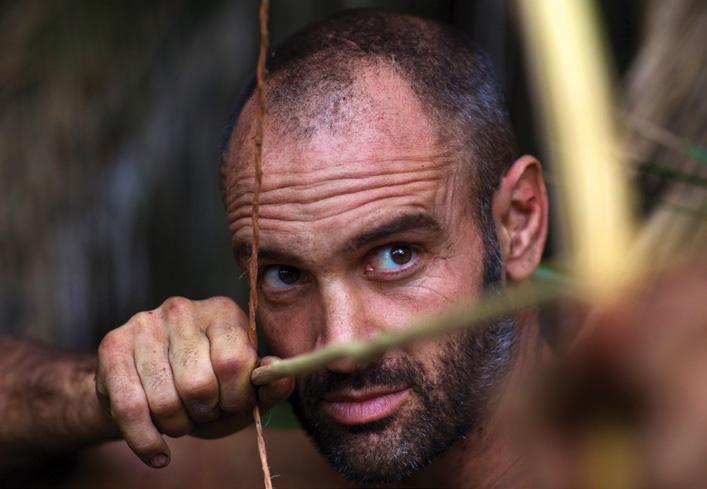
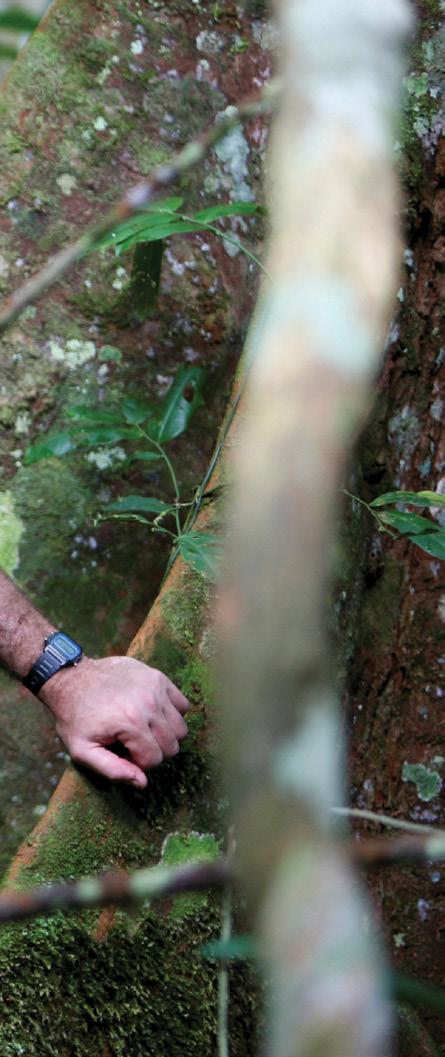
I’d always had it in the back of my mind. The idea of going downriver, being the first to navigate it from source to sea, and interacting with indigenous communities appealed to me. I thought about how much more visually stimulating and incredible it would be to do it on foot, looking into the whites of the eyes of a tribal chief. It would draw upon soft skills – like humility – that enable people to trust you. I'd be using these skills to stay alive, rather than dodging arrows from a plastic kayak in the middle of the river.
I disagreed with those who said it would be impossible – it's walking from A to B, albeit 4,225 miles. But I didn’t realise how hard it would be, especially when my 20-strong team wound up being just two: me and my guide Cho.
What part of the adventure was most challenging?
I was naive and didn’t understand how indigenous people might think. My piece of paper with permission to be there meant nothing to them: they couldn’t read, and not many spoke Spanish.
I was held at gunpoint and arrow point; I lost count of the number of times I was told we would die. It made me nervous at first, but then I realised being scared used up all my energy. I just had to listen, smile and think: 'I’m doing this now. If we die, we die.' Luckily, Cho would do all the talking – he was quick to laugh and disarm them.
17
'A tribal chief was furious that my passport wasn’t signed personally by the Queen'
INTERVIEW
Ed Stafford First Man Out available to stream now on discovery+
Which moments stand out?
I was wrongly arrested for murder, having turned up the day after a man had gone missing. I was detained overnight, with four people standing round the house with guns, until a police officer turned up the next morning and let me go. On another occasion, a tribal chief was furious that my passport wasn’t signed personally by the Queen.
How did you cope in difficult times?
I set myself little goals. If I met them, I would be able to sleep in my hammock. My daily objectives were very functional for a few months: 'Have you moved forward? Have you eaten?' A goal might have been just washing all the jungle grime away at the end of the day.
If I did such an expedition again, it would be with more maturity and as a more relaxed, socially engaging experience but, back then, I was at the edge of my capabilities.
How did you cope spending two months on the deserted island of Olorua?
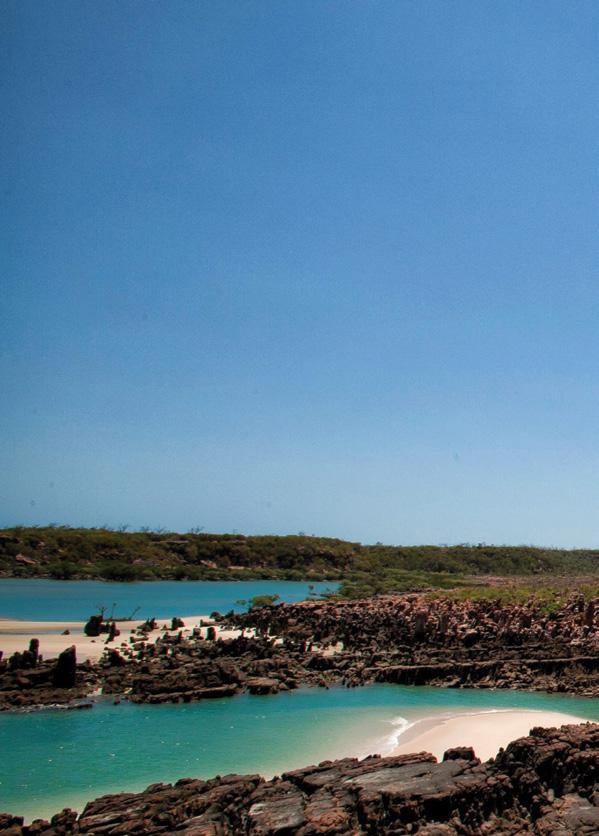
It was about devising strategies. You need a toolkit of things to keep yourself in a good frame of mind. The same was true in the pandemic when many people struggled with isolation. Managing your mental health is a responsibility in life.
What was it like filming 60 Days with the Gypsies and 60 Days on the Estates?
It’s a challenge to win a community's trust so they will let you into their world, enabling you to tell their stories and open viewers' eyes to something they don’t normally see. It’s similar to the nuances of getting a tribal chief onside when he’s got every desire to stick an arrow in your head – although on the estate, it was actually a gun down a dark alley. It’s about being nice and being human. It was a privilege and a rewarding experience.
What inspired your love of the great outdoors?
Growing up in the Leicestershire countryside in the 1970s, I’d roam the fields with a posse of mates from my village. I’d say goodbye to my mum in the morning and come back as it was getting dark. We’d play football, build bivouacs, dam streams, run around with guns made out of sticks and go on manhunts which could last multiple days, despite having to go home for tea each evening. I was always shy in my social interactions with adults and didn’t have a huge amount of confidence. The outdoors was the opposite of that; I felt more comfortable in myself.
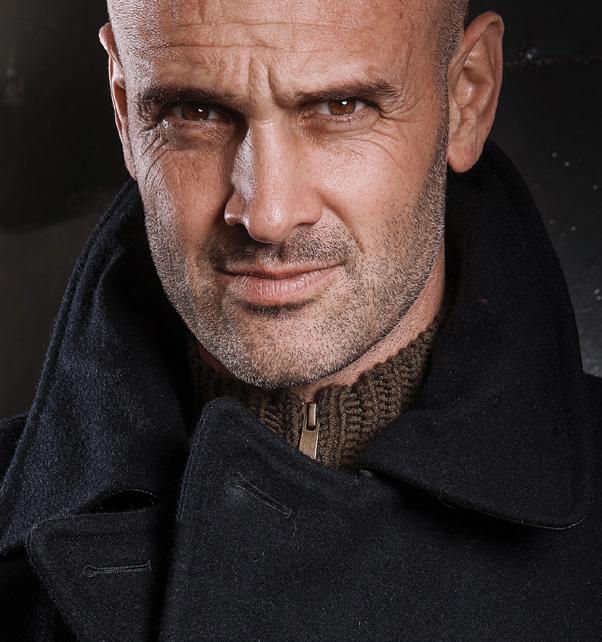
18
Ed survived as a modern-day Robinson Crusoe on Olorua, an uninhabited island of the Lau Archipelago
What did you like about being in the Army?
I went to Sandhurst in 1998, made the rank of captain and was assigned to the Army Training Regiment in Lichfield to train Stage 1 recruits. I think it was the relationships I formed with the men I commanded that I enjoyed most. Sometimes they have more life experience than you, so you can’t go in and start bossing them around – they'll tell you where to go. It’s all about “soft” skills: managing people to get them to want to do things for you. Also, we were pushed really hard – some of the exercises were tougher than the Amazon. It’s good to know you can push your limits.
You now live in Costa Rica. What's that like?
It’s great! There are pumas, ocelots and snakes, but I’m not worried. It’s so healthy for our children to grow up here.
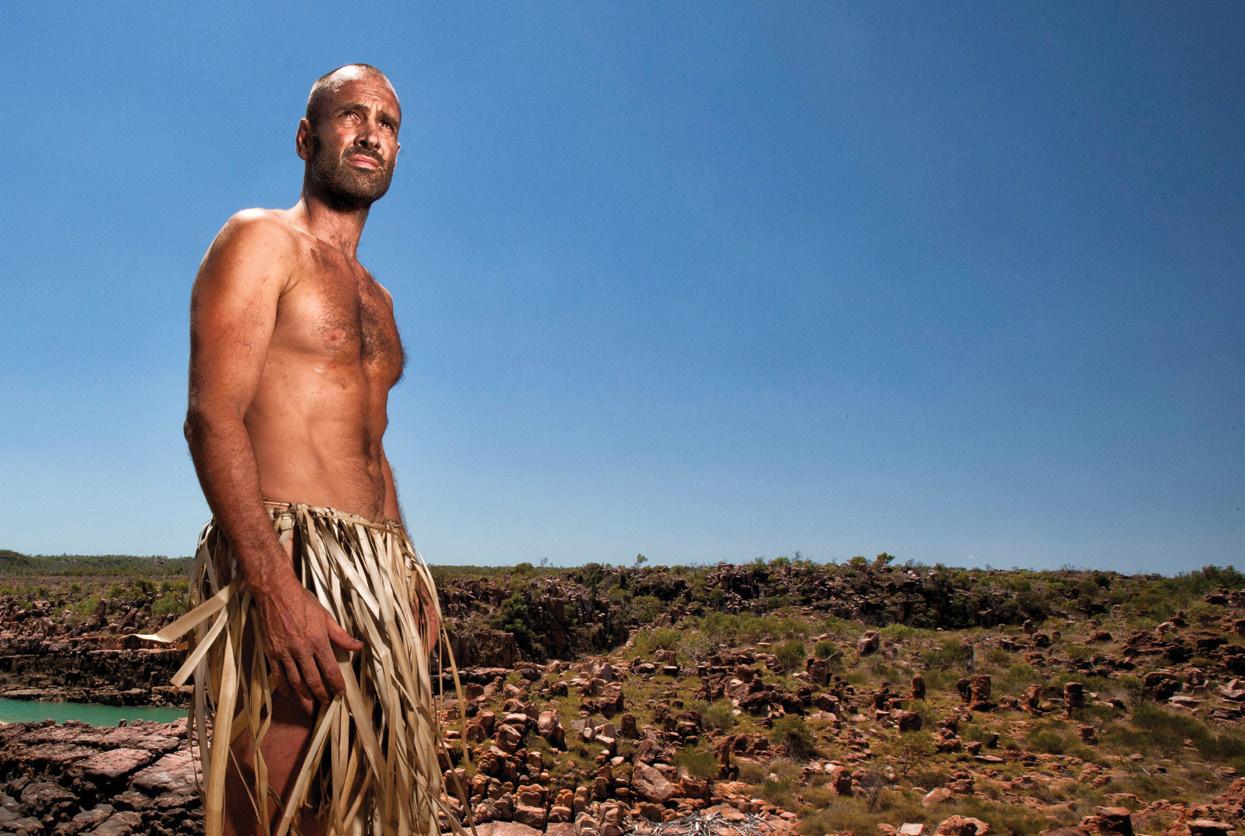
Before our move my wife asked: 'Am I going to be cleaning this kitchen for the next 40 years of my life?' We had fallen into the daily grind of school runs and play dates. Our son Ran is nearly six, our twin daughters are three, and it struck us that we had a window of opportunity for an amazing family adventure. I’m lucky that I can do what I do from anywhere. Costa Rica is a safe country with a great environmental ethos, having had success in reforestation over the last 30 years. Everyone we told said: 'I wish I could do that.' Guess what? You can!
What do you owe to having been in the Cadets?
A lot. It’s all part and parcel of what’s made me who I am. It helped prepare me for the military world, with all its challenges and rewards. It’s easy to be lazy and do the least work possible, but the more you put into life, the more you get out. Being in the Cadets gave me the kind of education you can’t get in a classroom.
19
'I lost count of the number of times I was told we would die'
INTERVIEW
'Being in the Cadets gave me the kind of education you can’t get in a classroom'
Ed Stafford First Man Out available to stream now on discovery+
12 TIPS FOR AUTHENTIC LEADERSHIP

if we understand what it

There are thousands of books written about leadership, thousands more videos online and numerous gurus waiting to turn you into an inspiring leader. Bad leadership leads to disasters while good leadership is probably the single way people can change the world for the better.
Does leadership take years of practice? Hours reading academic books? Do you need an important-sounding job title? Actually, no! In 1952, the great military leader Field Marshal Slim spoke to a group of officer cadets at Royal Military Academy Sandhurst and said:
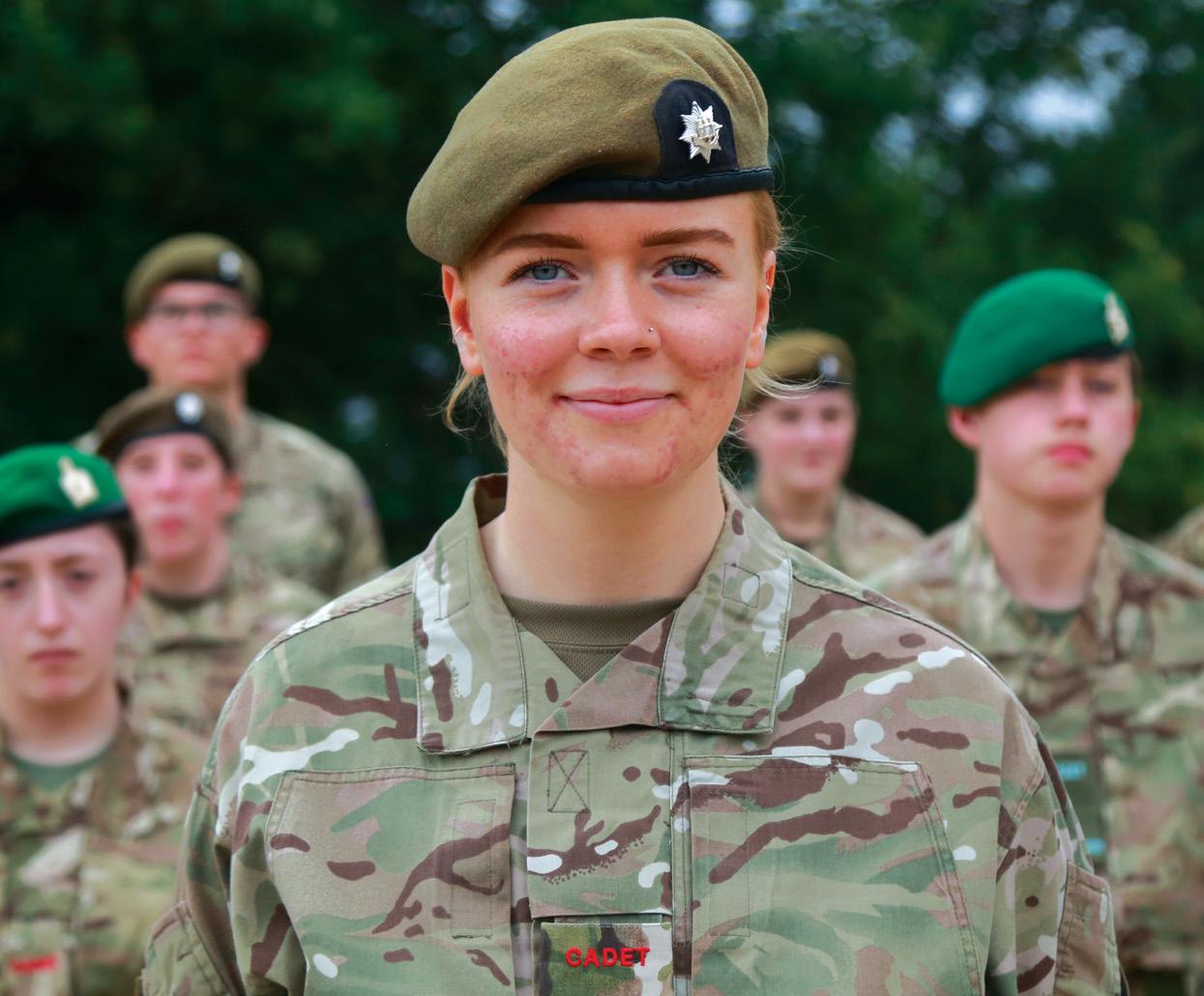
‘Leadership is the most personal thing in the world, for the simple reason that leadership is just plain you'.
Read on to discover 12 insights that'll help you develop authentic leadership skills.
1Know yourself
Trying to be someone you are not might work for a while but, over time, will become exhausting.
The first thing every leader must understand is themselves: their strengths and weaknesses, how to make the most of the things they're great at, and what they can do to develop in areas that are challenging.
Don’t be afraid to accept there are some things you simply won’t excel at as a leader; that’s where having a great team comes in. Take time to discover who you are and which leadership style feels most comfortable and intuitive to you. A good starting point might be taking the personality quiz in the Go Further box at the end of this feature.
Sarah McEntee, SO2 Leadership Cadet Forces, thinks we've all got the capability to be an authentic leader –
takes.
20
2
Know your people
Why does that cadet in your detachment always turn up late and in the incorrect uniform? Why has a previously brilliant cadet suddenly decided to leave? Why has your second in command decided not to talk to you this evening?
To be a supportive leader, as well as a leader who can challenge when required, you need to have a good understanding of the people in your team.
Colonel Neil Jurd OBE is the Director of Initial Officer Training for the ACF and in The Leadership Book he talks about The Foundations Model (Figure A).
On the surface we see a person’s behaviour, achievements, performance and focus, but all those things are impacted by what is going on underneath at foundation level. These are things we can’t see but as leaders we need to understand. What might be going on beneath the surface for the people described above?
3
Communication matters
Can you think of a time when something didn’t go to plan? Chances are poor communication played a large part in messing up that plan. One of my favourite leadership concepts is the Communications Pyramid, because it’s a simple, relatable and easy-to-use leadership tool (Figure B, over the page).
Below the bottom of the pyramid is the dreaded Tomb, where there is no connection, no communication, nothing. This is the person you walk by every day to catch the bus and don’t even acknowledge each other. In fact, you actively choose to avoid them by looking down or away. You probably do this many times a day.
Ritual and Cliché
Level one is the domain of Ritual and Cliché conversations. Where I live in the northwest of the UK, most mornings I see the same people and we say, ‘Hi, you alright’? The reply is: ‘Yeah I’m alright’. We’ve spoken but it’s a ritual. It’s the same thing every morning and the answer is almost unimportant.
5
Facts and Information
At Level two is Facts and Information. This is the sharing zone, where we discuss things we know or have heard. On detachment night, these might be the chats you have with cadets about kit or perhaps you're passing on instructions about the plans for the night. Some cases, like issuing a set of orders, are essential information. As a leader you’ll often have conversations at this level, but it isn’t where you really get to know people.
6
Ideas and Judgements
Personalities and ideas begin to shine through when you reach the level of Ideas and Judgements. You might begin to get this towards the end of a training session or perhaps by day two or three of an overnight exercise on annual camp. It’s where people begin to share their opinions. As a leader you want to encourage this level of communication, particularly when you are relying on a team to work together to find a solution on a cold, dark and windy night in the middle of a training area.
7
Emotions and Feelings
The magic really begins to happen at level four: Emotions and Feelings. This is the type of conversation where you get to know the team you're leading. You build trust and can have open and honest conversations on an emotional level. You might have experienced this with your best mates or maybe towards the end of a camp or course. It is where, as a leader, you should aspire to be with your team.
8

Peak level
Beyond level four is Peak: when you don’t need to say anything to your team as a look or a nod is enough to inspire an action. It’s a pretty cool place to be and is probably where you are with your very best friends. So how do you progress from Ritual and Cliché, or even worse the Tomb, to Feelings and Emotions and Peak? In the Army Cadets we can find ourselves in many exciting and challenging situations where we must build relationships with new people quite quickly.
Figure A The Foundations Model from The Leadership Book by Neil Jurd OBE
Behaviours Performance Results Achievements Focus Stress Feelings Physical Health Mental Health Beliefs Stimulants Self-esteem Physical Pain Emotions Values Mood Observable Invisible
4
21 LEADERSHIP
Tomb
10
Peak Rapport
Feelings & Emotions
Ideas & Judgements
Facts & Information
Take risks
In your role as leader, you could be dropped into a team and have very little time to build connection. It can be challenging to start conversations that move you up the pyramid. It feels risky, but my best advice is to spend time listening before talking. Look for the unseen (body language) and know that by sharing your feelings you're allowing others to share theirs. That's how you get people on board and what enables a leader to support when needed and challenge when required.
11
Ritual & Cliché
Communicate your vision
One of the three core components of the Army Cadet Leadership Code is 'vision'. You can have all the leadership skills in the world but if you and your team don’t know what the purpose or mission is, everything becomes unfocused and people lose interest.
Elon Musk’s SpaceX company has a strong, clear and compelling vision: ‘To revolutionise space technology with the ultimate goal of enabling people to live on other planets’. Sports brand Nike uses: ‘Nike strives to support every athlete in the world’. That includes you and me, not just Sir Mo Farah!
9

Build rapport
Before I had the privilege of working for the Army Cadets, I spent many years as a radio presenter. My first job was to drive around and call back into the morning show with live, often silly, links. I spent one morning broadcasting from inside a metal dustbin on a golf driving range. In every scenario I had a very limited amount of time to brief members of the public on what to say (facts and information in Figure B above) and in every case I had to very quickly build rapport, calm their nerves and lead them through something out of their comfort zone (feelings and emotions in Figure B above). At the same time I needed to have a deep understanding of what the guys in the studio wanted, which frequently changed at the last minute. I had to be at Peak level with my co-hosts.
How did I do it? When I turned up, I tried to build a rapport by asking questions to find common ground. Sometimes that might simply be saying I was feeling nervous too and that we’d get through the moment together and enjoy it. By being honest about my feelings and emotions in that moment, I was able to move quickly from level two to level four of the pyramid in Figure B.
Learn from mistakes
Whether you are leading the same team every week in your detachment, or are assigned a team as part of a single exercise, you’ll need to know what your vision is and how to communicate it clearly. 12
Leadership can be challenging and sometimes lonely. Leadership in the Army Cadets frequently requires you to step up and lead your friendship group, which can also change those relationships. You won’t always get things right, but accepting failure and learning from it is something great leaders embrace. Your leadership style will evolve and develop over the years, but the single most important thing you can do is to lead authentically. After all, ‘leadership is just plain you’.
Go further
Figure B The Communications Pyramid by Father John Powell
'The magic really begins to happen at level four'
22
Click here or scan the QR code to take a personality test and discover more about your leadership style.
This great value 25 litre daysack is constructed from hardwearing, 1000 denier MTP-compatible nylon fabric. The 25 litre capacity is perfect for short day patrolling and fieldcraft use. The pack features a spacious main compartment and an integral snow lock with drawstring closure.
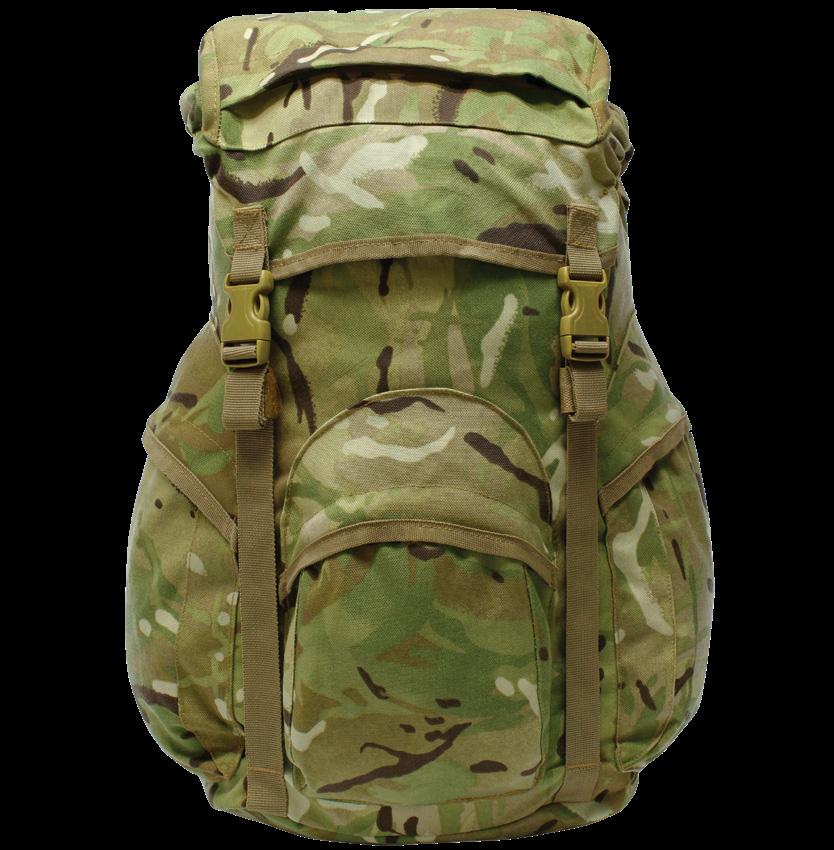
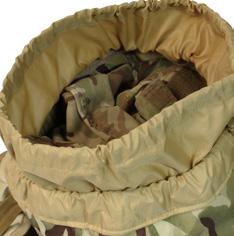
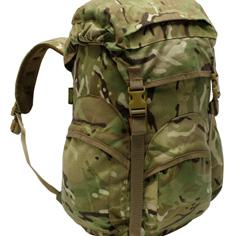
There are two zipped side pockets and one zipped front pocket, which all have storm flaps. The top cover has an additional zipped pocket and
:
KIT REVIEW

a waterproof lining to keep everything inside dry. This pack also has fully adjustable, padded shoulder straps which have webbing straps (to attach a roll mat or other equipment).
The rear of the pack is padded with cushioned air mesh for comfort and ventilation. There are two front compression straps with quality quick release buckles and strap retainers.
Size: 52cmH x 40cmW x 20cmD.
Weight: 700g.
Price: £29.95
Click here or scan the QR code to order yours.
23 Supported content
Kammo Tactical Daysack 25L, MTP kit review
Colour: Multi-Terrain Pattern.
take the test
Navigation
Are you a whizz with a map and compass? Let National Navigation Officer Colonel William "Ginge" Morris put your orienteering skills to the test.
Apenchant for planning routes, taking bearings, reading maps and mastering a compass began for Colonel William "Ginge" Morris ACF when he joined the Cadets in 1976.

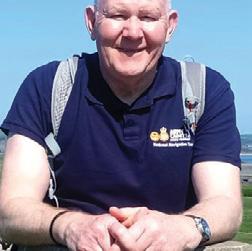
Ginge first learned to use a map and compass when he undertook his Bronze Duke of Edinburgh (DofE) Award. He then went on to complete Gold and, after leaving Army Cadets in 1980, joined the Army where he utilised his orienteering skills. Today, he advises CFAVs who want to teach navigation skills to budding adventurers within Army Cadets.
As Commandant of Gwent and Powys ACF, he also enjoys seeing cadets take the Army Proficiency Certificate and progress from one star to four star in their navigation skills.
What’s the best advice you have ever been given about navigation?
When I was a cadet doing my Bronze DofE at Crowborough Training Camp in Sussex, I had a great instructor, Captain Byron Jenkins, who told me that a map is like a big storyboard. If you spend all your time looking at the storyboard rather than the real-life picture in front of you, then you’ll get confused and lost.
To this day, I tell my trainees the same thing: think of your map as your storyboard and, once you’ve confirmed where you are, then start observing the greatest source of information which is the ground beneath you and the terrain over which you’ll be walking. You then only need to refer to your map for tick off points (for instance an upcoming turning) along the way.
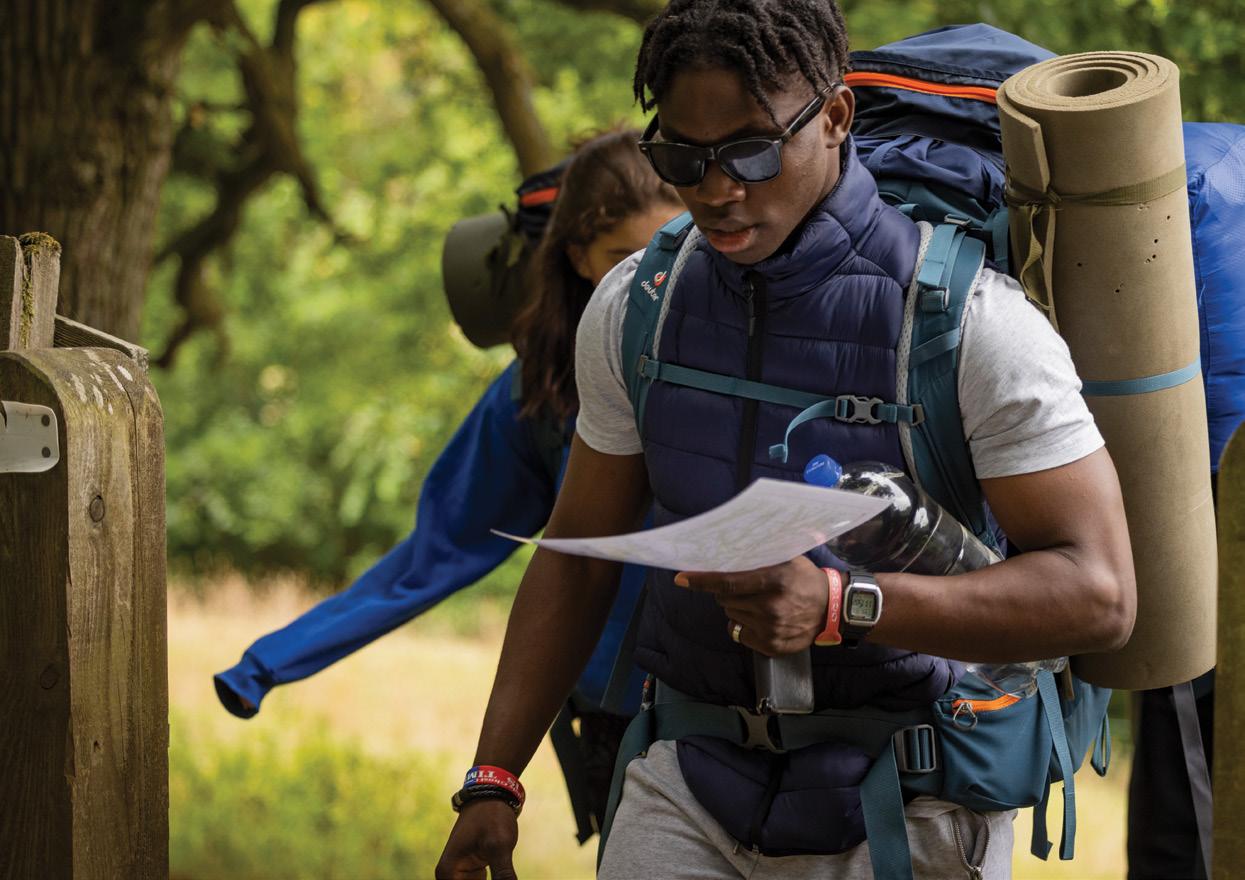 Photo: Kate Knight
2nd Battalion The Highlanders ACF camp
Photo: Kate Knight
2nd Battalion The Highlanders ACF camp
24
Are we all capable of being able to navigate?
Everyone, from parents to children and pets, has a sense of navigation. When a new cadet is scared of navigation we ask them to draw where they live and their local school on a piece of paper. We then ask them to map out how they usually get to their school: which way they turn on leaving their house, the roads they take and any tick off points (for instance a local shop or a football field) along the way.
Other than a map and compass, what do you need for navigation?
In training, we ask a person where they want to go and to write down on a route card how they would get there. We ask other participants if they understand the destination and the route they would need to take to get there. We then say: ‘Okay, you take us there.’ They often look at us as if to say: ‘How are we going to do that?’ We remind them they have their route card with all the directions and tick off points. Then they're happy to lead the way without their face being constantly buried in their map and compass.
What leadership qualities do you develop by mastering navigation?
Confidence and self-reliance are key attributes but also the ability to plan and prepare. When you're taking part in navigation you’re likely to be out for several hours so you need to think ahead about what equipment to take, what clothing you will require and what food and water provisions you will need. You’ll also need to prepare a route card in advance and leave a copy with a responsible person so that, if you’re not back by an agreed time, they will know where to look for you.
Why is map reading such a useful tool?
It’s a core skill embedded in many disciplines within the Army Cadets syllabus. For example, if you are doing fieldcraft and told by your company commander to find an enemy position, or meet someone at a rendezvous point, you would need to get there using a map and compass.
A cadet doing the DofE Award may be exceptionally fit and motivated but would fail if they couldn’t navigate to checkpoints. In first aid, you need to be able to pinpoint your location on a map and communicate the correct grid references to emergency services if you need to call for help while on expedition. Even within shooting, arcs of fire are measured using compass bearings so that firing stays within a safety zone.
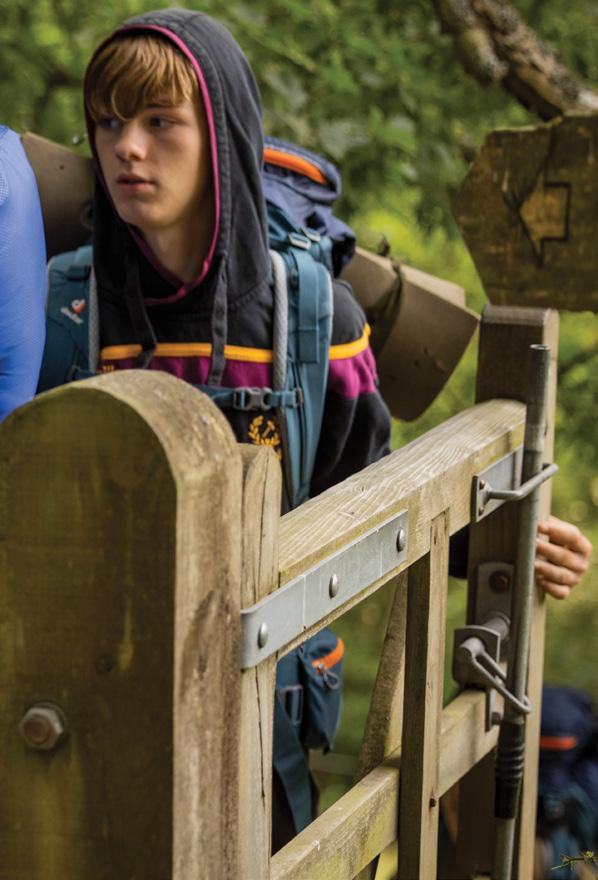
What are the most common difficulties with navigation?
Some struggle with the mathematics needed to do what we call a ‘back bearing’, but there are tips to overcome this. Others become confused about which arrow to follow on their compass: the arrow direction or the magnetic needle? The magnetic needle moves around so it always points north, therefore it’s important not to accidentally follow it and head off in the wrong direction.
What’s your favourite piece of life advice?
Always know where you want to go but never forget where you came from. If something goes wrong, you can always retreat to where you came from.
25
'Know where you want to go, but never forget where you came from'
TAKE THE TEST
Take the test
1Which of these symbols correctly matches its description?
2What are the lines on a map called that indicate the height of ground?
A. Contour lines
B. Composition lines
C. Curve lines

3What is the name of the numbers on a map, which increase as you go left to right?
A. Northings
B. Eastings
C. Southings
4What are the three common norths we use in navigation?
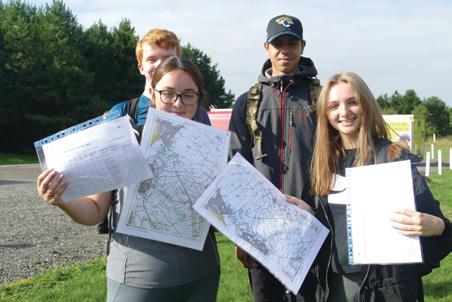
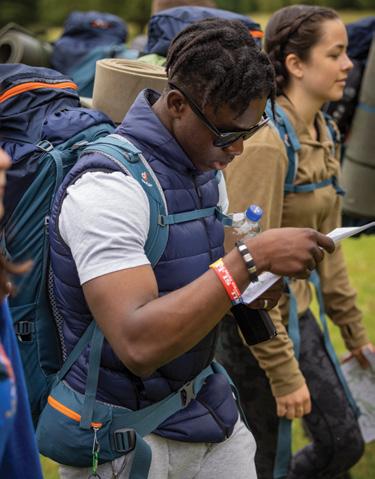
A Magnetic north, grid north, true north
B Magnetic north, grid north, polar north
C Magnetic north, geographic north, true north
5Can you work out the six-figure grid reference for A, B and C in the example below?
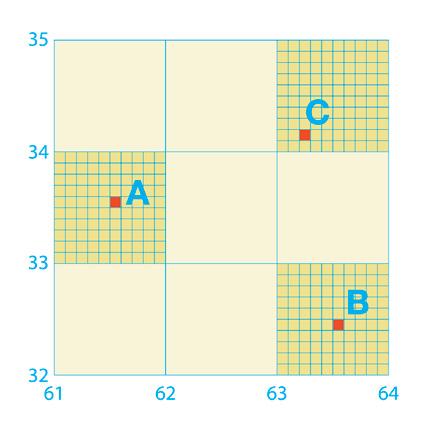 C. Hospital B. Underground station
C. Hospital B. Underground station
26
A. Current or former place of worship with a spire
TAKE THE TEST
ANSWERS
4. A Magnetic north – the direction any magnet compass will point.

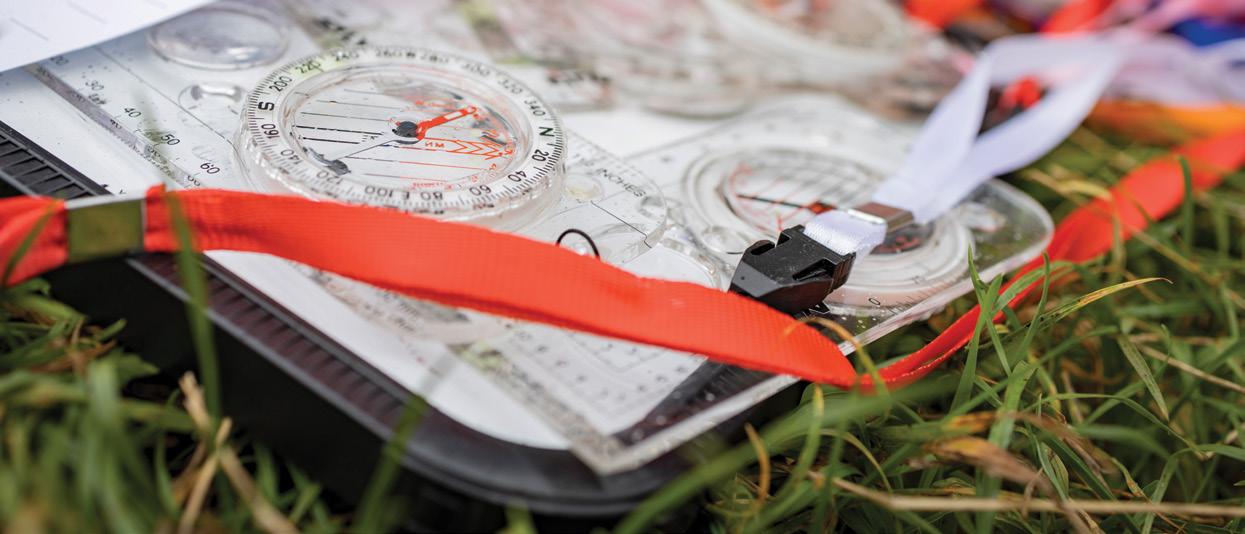
Grid north – the direction of a vertical (north-south) grid line on an OS map.
This sign indicates a heliport not a hospital.
Maps have symbols to represent different landmarks such as places of worship, car parks, pubs, and schools. You can match symbols with the corresponding landmarks in your surroundings to help locate your position on the map. Each map will have a key to its symbols so, if in doubt about the meaning of a symbol, consult the key.
2. A The height and shape of the land is shown on a map using contour lines. These are thin orange or brown lines with numbers on them. The number tells you the height above sea level of that line. A contour line is drawn between points of equal height, so any single contour line will be at the same height all the way along its length. The map key will tell you the contour interval used.
3. B Before you begin to look at grid references it is important to be aware that all the numbers going across the face of the map, for example, left to right, are called eastings (this is because they are heading eastward). Similarly, all the numbers going up the face of the map from bottom to top are called northings (because they head in a northward direction).
5. A 615 335 B 635 324 C 632 341
When giving a four-figure grid reference you give the eastings number first and the northings number second – you go along the corridor (horizontal) and then up the stairs (vertical). This will give you the basic four-figure grid reference.
For example, the four-figure grid reference for point A is 61- 33 -.
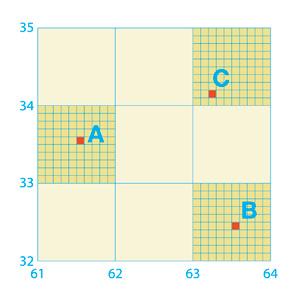
To get the six-figure grid reference, imagine this square is divided up with 10 squares along each side. Still remembering to go along the corridor and up the stairs, work out the extra numbers you need and put them into your four-figure grid reference.
For example, the six-figure grid reference for point A is 615 335.
This sign indicates a bus or coach station, not an underground station. 27
1. A This sign indicates a current or former place of worship that has a spire, so is the correct answer.
True north – the direction to the Earth’s geographic north pole.
HIGHEST
Cdt

ACF reveals what it's like to be a Lord-Lieutenant's Cadet.
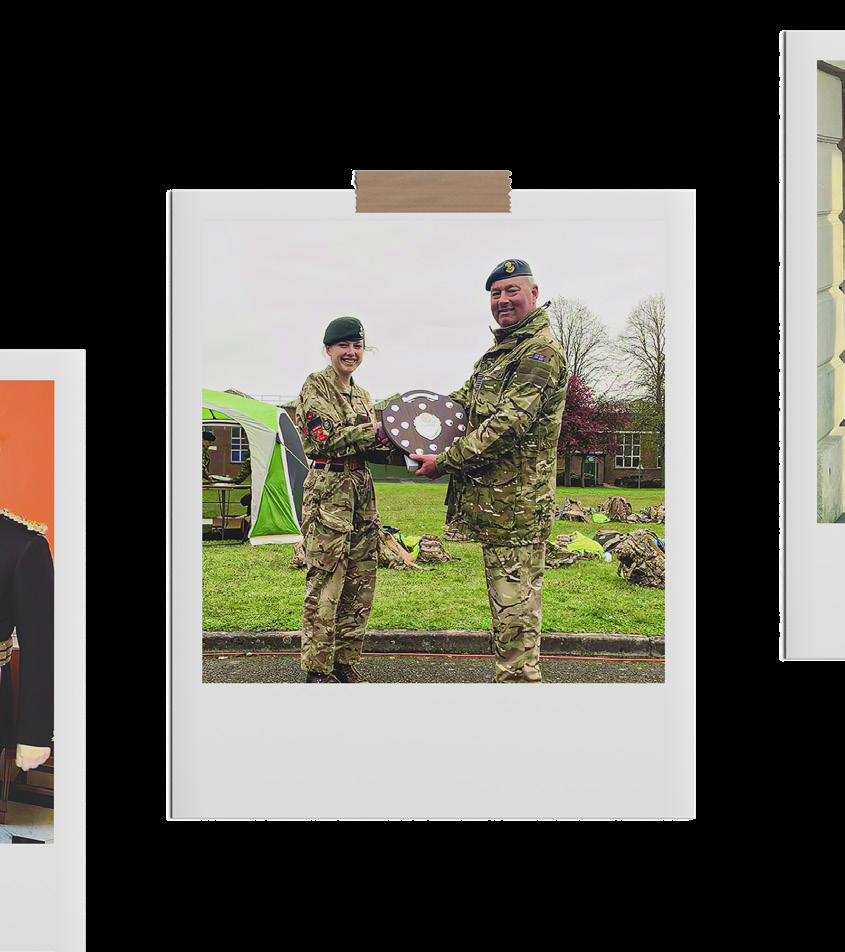
ALord-Lieutenant's Cadet is a representative of the cadet forces to the British Royal Family and acts as an aide to the LordLieutenant of their county. To find out more about what the role entails, we caught up with 17-year-old Cdt RSM Hope Relph from Taunton who is a Lord-Lieutenant's Cadet in Somerset.
Tell us about your Army Cadets career?
I joined when I was 12 years old. My dad was (and still is) a CFAV and my brother was a cadet and I wanted to get involved. I’ve now passed the whole syllabus. I’ve done my Bronze and Silver DofE Awards and I’m currently doing my Gold. I’ve done adventurous training and fieldcraft training courses too. When I turned 17 last year I became RSM, which means I’m in charge of the whole of the Somerset
ACF, which is approximately 600 cadets. If there are any problems, I sort them out. I also go on visits to different camps. It’s a really busy job and involves lots of planning, but I really enjoy it.
How did you become a Lord-Lieutenant's Cadet?
Last September I was told I’d been put forward by my Company Commander for the position of Lord-Lieutenant's Cadet. It was a complete surprise. I was so honoured and it felt like all the hard work I’d put in over the years had paid off. It’s such an amazing opportunity. I had to go to the Lord-Lieutenant’s office for an introduction with the other nominated cadets, and we then had our investiture in October.
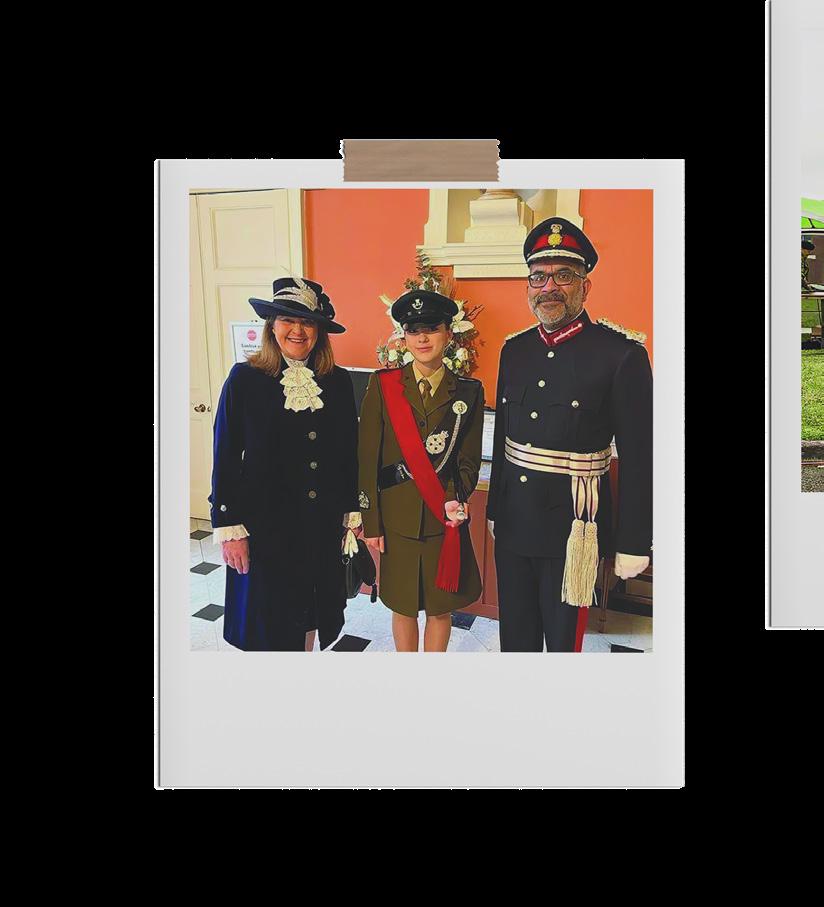
28
'It's fantastic to be asked to not only represent the Cadets but the Royal Family too'
RSM Hope Relph of Somerset
Cdt RSM Hope Relph alongside High Sheriff Jennifer Duke and Lord-Lieutenant Mohammed Saddiq
Cdt RSM Hope Relph receiving the Best ACF Team Award on behalf of Somerset ACF at Cosford
What are your main duties in the role?
I assist the Lord-Lieutenant of Somerset at civic and military occasions and represent the cadet forces to the British Royal Family. In Somerset we have five Lord-Lieutenant's Cadets in total, one from each cadet force.
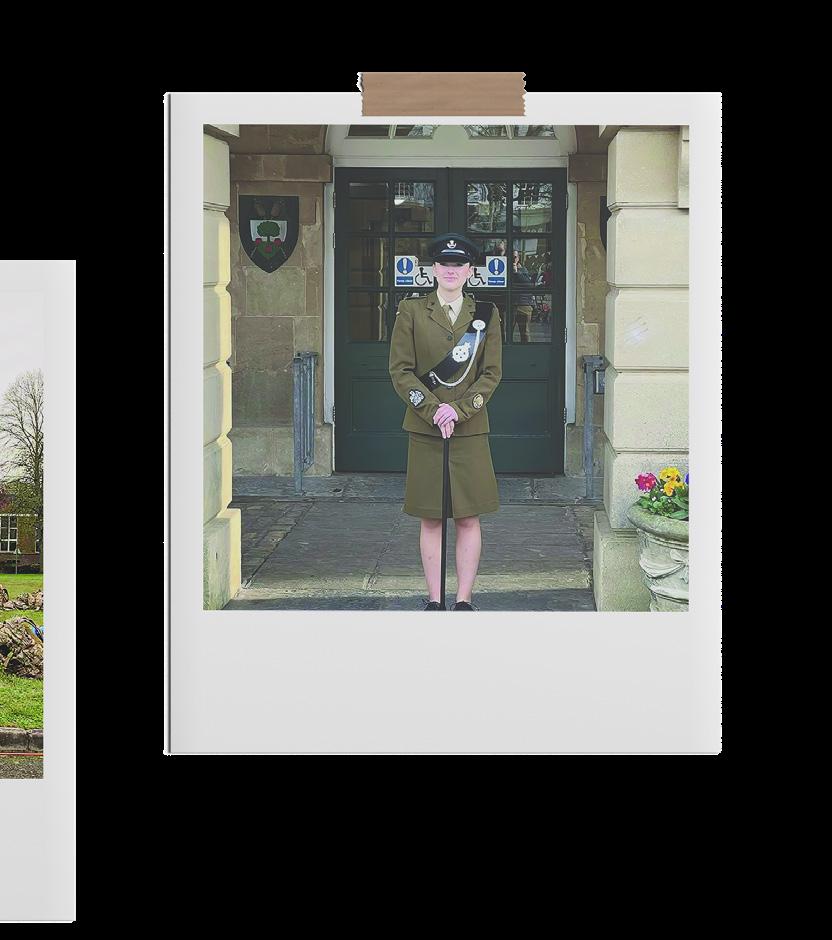
One of my first events was Remembrance Day. I joined other local dignitaries like the mayor and the chief of police. More recently, I went to the British Empire Medal ceremony in Taunton. The Lord-Lieutenant’s office usually emails me a few months in advance of an event and asks if I’d like to attend. I think I’ve been to every one they’ve invited me to, because I really want to make the most of the experience. I’m lucky that my dad is happy to drive me to most events, as I don’t yet have my licence, and college allows me to leave classes early if there’s somewhere I need to be.
HONOUR

What do you enjoy about it?

The opportunities are amazing. It’s fantastic to be asked to not only represent the cadets but also the Royal Family. I meet so many people who are willing to give cadets opportunities and that’s so important because we’re a youth organisation. The experiences we are given we can take forward into our lives, no matter what we go on to do. On a personal level, it’s given me so many new skills and really built my confidence. Before I joined the Cadets I was really shy and quiet. Now I have overwhelming confidence and feel like I can go on and achieve what I want to do.
What's been your most memorable moment?
Meeting Queen Camilla at the opening of the Royal Osteoporosis Society’s new offices in Bath. I was a bit nervous beforehand but at these events I always have adults from Cadets with me who help me to prepare and offer support. The Queen was really lovely and we had a brief chat. She’s the Colonel-in-Chief of The Rifles and in Somerset ACF we wear The Rifles cap badge, so it was a good conversation starter.
What would you like to do as a future career?
I’m at college studying nursing and my plan is to get my degree and go on to become an Army Officer Nurse. What I’ve achieved as a cadet has definitely inspired my career and given me lots of different skills, including a qualification in First Aid at Work.
Would you recommend joining Army Cadets?
I think everybody should be encouraged to do it. We learn so many things including first aid, fieldcraft, adventurous training, navigation, expeditions and loads of essential life skills. I think it brings out the best in people. It’s truly amazing how many young people are shy and have low self-esteem, but then they join Cadets and we help build them up to be the person they want to be, and give them the opportunities to do what they want to do.
29
INSPIRATION
Cdt RSM Hope Relph pictured in the city of Wells on official duties
CADET'S GUIDE TO
National Healthy Minds Officer Lt Col Keith Walters shares
five ways that Army Cadets helps support happiness, wellbeing and good mental health.
Build connections
Feeling close to and valued by others is a basic human need; social relationships are critical to our wellbeing.
‘Being part of the Army Cadets is a good chance for you to build new friendships and a sense of belonging and camaraderie through teamwork activities,’ says Keith.
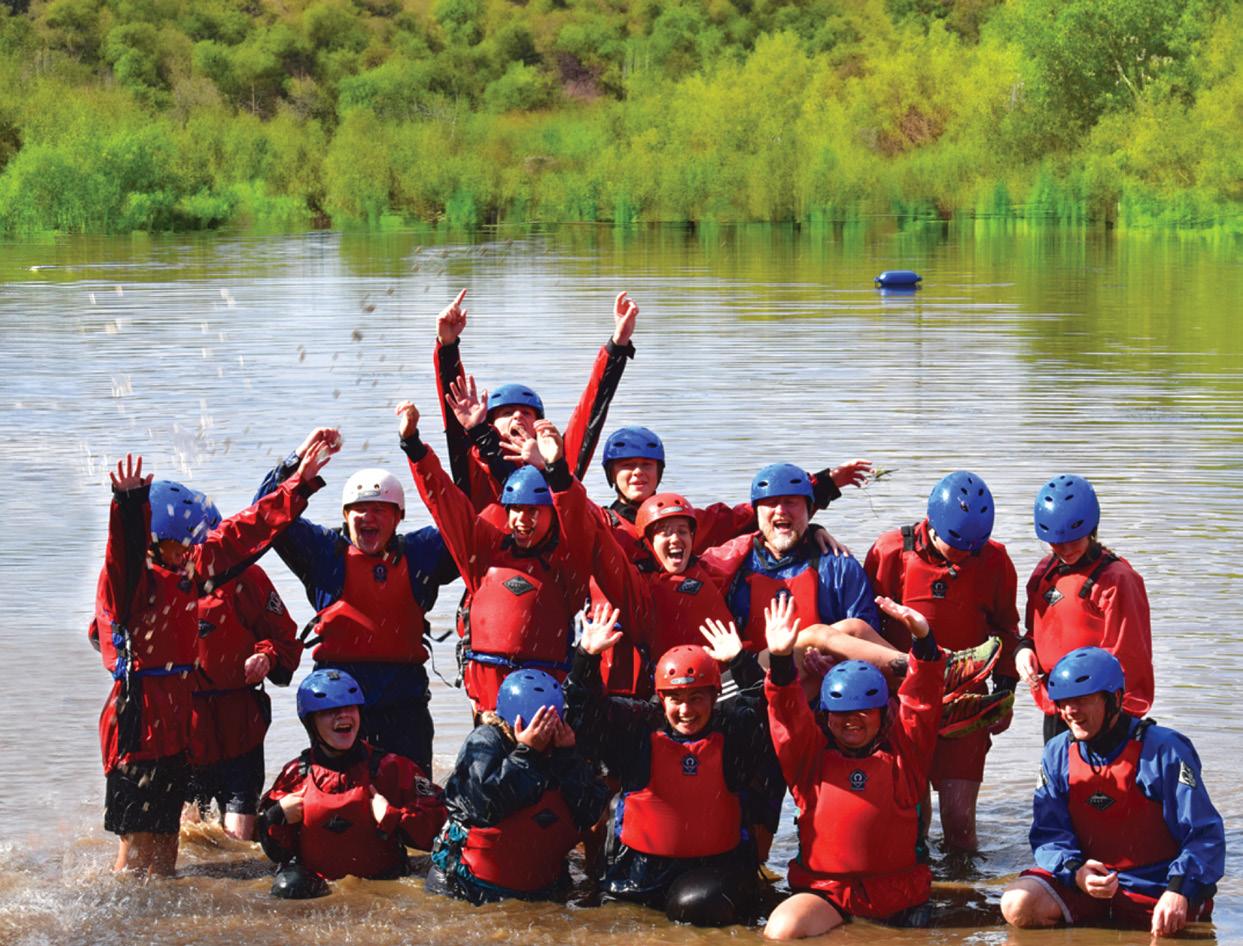
Stay active

Regular exercise releases stress and a feel-good hormone which can improve your mood and boost energy levels. It also helps you sleep better and can lower levels of anxiety and depression.
‘You don’t need to be a gym bunny or super fit to feel the positive benefits of exercise.
'Walking, dancing, skipping and team sports can all elevate your mood and Army Cadets keeps you active through drill, fieldcraft, shooting, navigation, expeditions and physical training.’
Take notice
We live in a digital age where many of us use our devices to socialise with friends, browse social media, watch TV and play games. The trouble is, we sometimes spend so much time online that we lose connection with the real world around us.
‘Army Cadets promotes mindfulness by encouraging you to live in the moment. You get absorbed in a wide range of different activities,’ says Keith. 'This helps your mental wellbeing by rooting you in your environment and focusing your brain on the job in hand.'
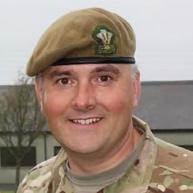
30
Healthy Minds
When we feel good on the inside, we are better prepared to handle stress or pain that comes our way.
Army Cadets understands the value of adopting a positive mindset and building personal resilience, which is why we focus on building Healthy Minds awareness into our adult training and cadet syllabus.
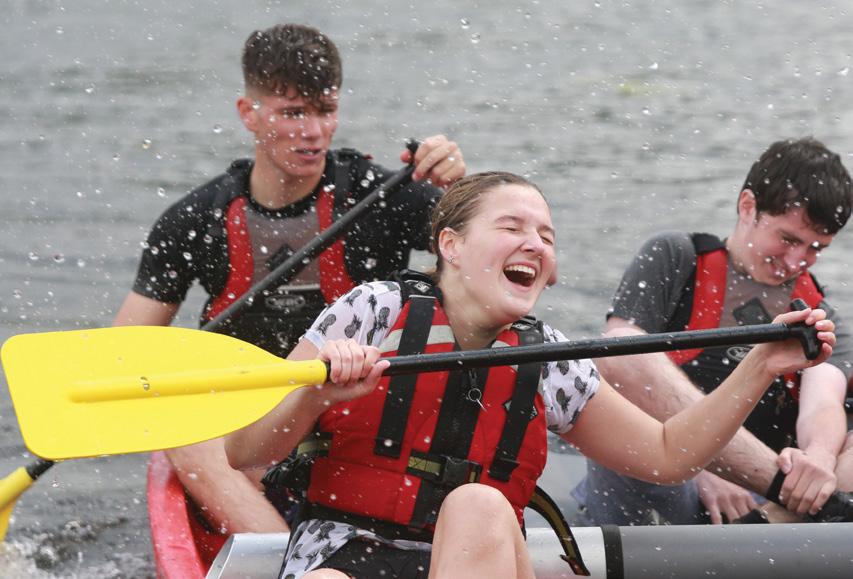
‘Mental health includes our emotional, psychological and social wellbeing,' says Keith. 'It affects how we think, feel and act. It also helps determine how we handle stress, relate to others and make choices. Through Army Cadets Healthy Minds we want to break down barriers, reduce stigma and promote mental health awareness.’
Army Cadets has collaborated with Young Minds to develop Healthy Minds Awareness courses for CFAVs which focus on supporting the mental health of young people. There’s also a senior cadet course about peer-to-peer mentoring. Look on Westminster for upcoming courses and book via your county or contingent.
Learn new skills
Army Cadets gives you the chance to learn new skills, such as drill and shooting, as well as externally accredited recognition through BTECs, awards and certificates. You also learn life skills like integrity, loyalty, teamwork, leadership and selfless commitment.
‘Army Cadets is a chance to learn new skills that will help boost your self-esteem, self-reliance and resilience,’ says Keith. ‘It doesn’t matter if you don’t excel in any specific subjects or sports: our syllabus gives you the chance to achieve, regardless of your background or ability.’
Research suggests that acts of kindness and giving can promote happiness and increase wellbeing. The Army Cadets community has over 72,000 cadets and 10,800 CFAVs committed to helping others. Community events you can get involved with include fundraising, helping local food banks, acts of remembrance, and learning and using first aid skills.
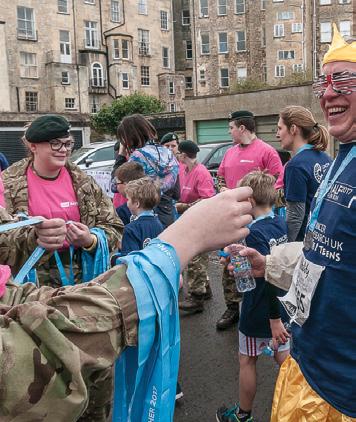
‘Giving is also about showing yourself self-compassion and being kind to yourself,’ explains Keith. ‘Avoid comparing yourself to others on social media as this can negatively impact your self-esteem. And remember, people only share their best moments on there – it’s not reality.’
Go further
Sometimes we feel we don’t have control over what we think or how we feel. The important thing is not to try and cope on your own. Don’t be afraid to ask your family, trusted friends, CFAVs or a professional service like Young Minds for help. Click here or scan the QR code to find out about Young Minds.
31
Give back and have self-compassion
'Acts of kindness and giving can promote happiness'
Photo: Peter Russell
WELLBEING
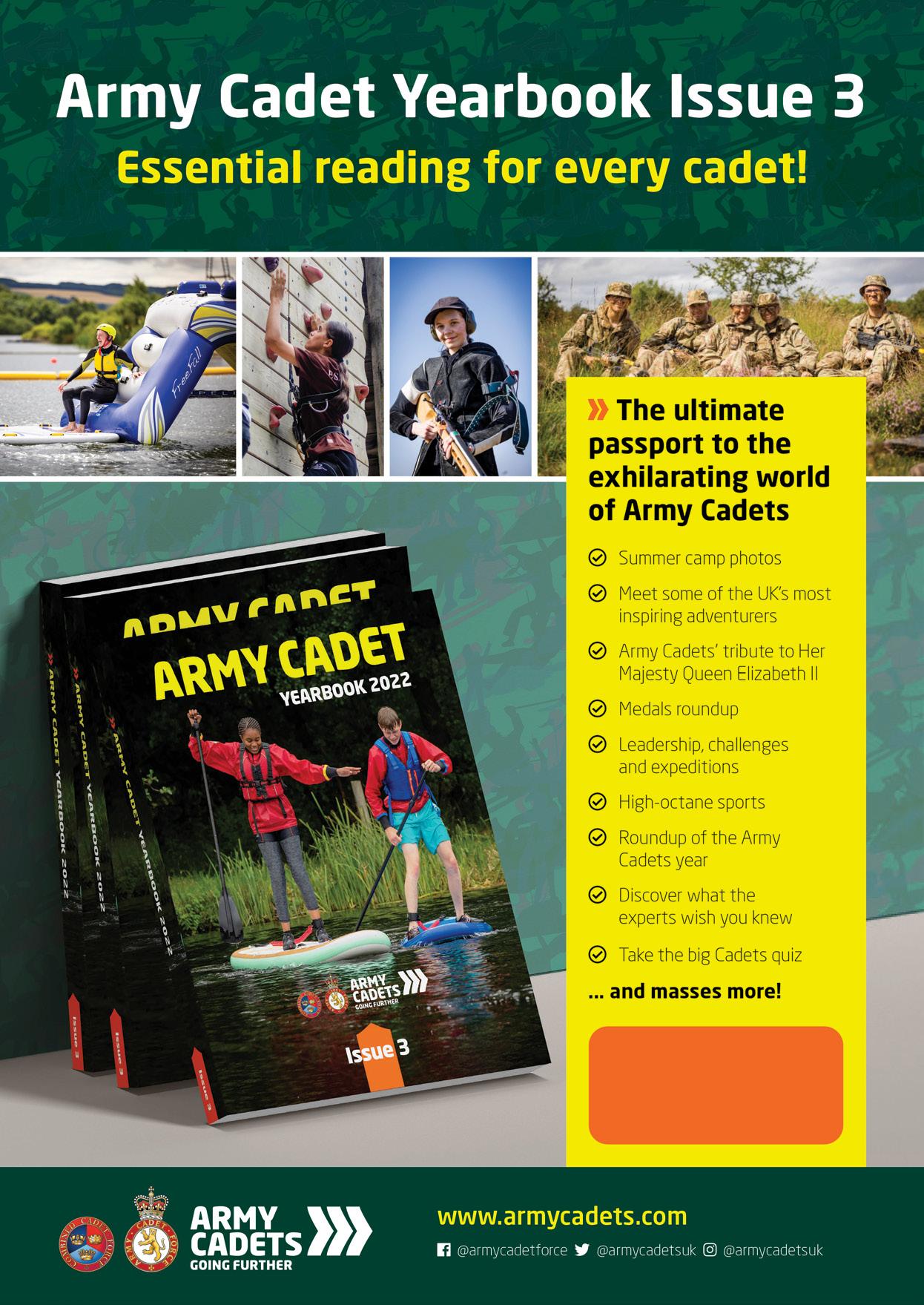
BUY IT NOW! Priced £15 Click here or scan the QR code
















































































 Photo: Kate Knight
2nd Battalion The Highlanders ACF camp
Photo: Kate Knight
2nd Battalion The Highlanders ACF camp




 C. Hospital B. Underground station
C. Hospital B. Underground station









































